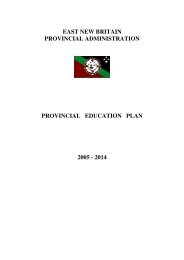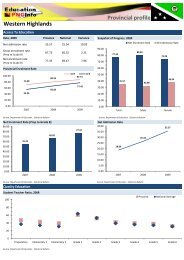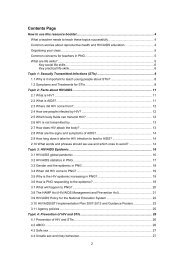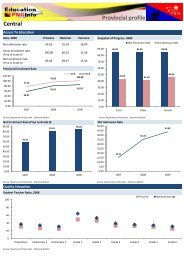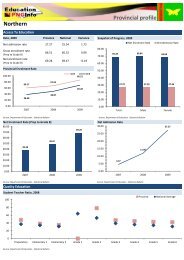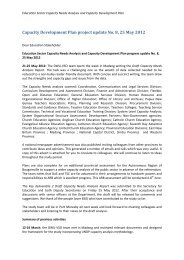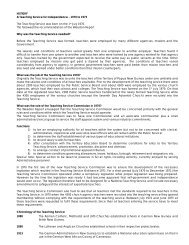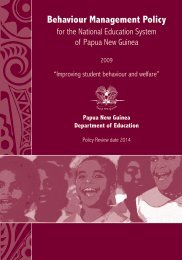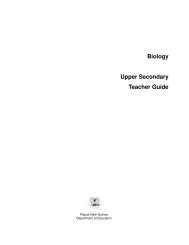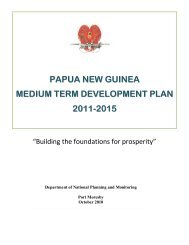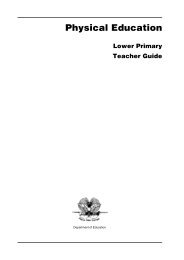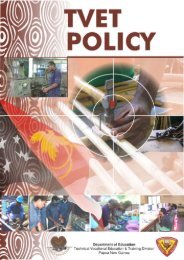HIV and AIDS POLICY - Department of Education
HIV and AIDS POLICY - Department of Education
HIV and AIDS POLICY - Department of Education
- No tags were found...
You also want an ePaper? Increase the reach of your titles
YUMPU automatically turns print PDFs into web optimized ePapers that Google loves.
DEPARTMENT OF EDUCATIONDEPARTMENT OF EDUCATION<strong>HIV</strong> <strong>and</strong> <strong>AIDS</strong> <strong>POLICY</strong><strong>HIV</strong> <strong>and</strong> <strong>AIDS</strong> <strong>POLICY</strong>for thefor theNATIONAL EDUCATION SYSTEMNATIONAL EDUCATION SYSTEM<strong>of</strong><strong>of</strong>PAPUA NEW GUINEAPAPUA NEW GUINEA2012-20162012-2016<strong>HIV</strong> <strong>and</strong> <strong>AIDS</strong> Policy for the National <strong>Education</strong> System 2012-2016
ForewordThis policy, the <strong>Department</strong>’s second <strong>HIV</strong> <strong>and</strong> <strong>AIDS</strong> Policy, is the result <strong>of</strong> an extensive process <strong>of</strong>assessment <strong>and</strong> consultation. An assessment was undertaken in 2011 <strong>of</strong> the implementation <strong>of</strong> thefirst Policy at the national, provincial, district <strong>and</strong> school levels. A high-level Policy ReviewCommittee provided oversight <strong>and</strong> extensive input <strong>and</strong> guidance on the revision <strong>of</strong> the policy. Thestaff working in the <strong>HIV</strong> <strong>and</strong> Gender Unit organized numerous consultations with our partners <strong>and</strong>other concerned parties. These included the church agencies, NGOs, UN agencies, donors, the<strong>Department</strong> <strong>of</strong> Health, the <strong>Department</strong> <strong>of</strong> Community Development, the National <strong>AIDS</strong> CommitteeSecretariat, the <strong>Department</strong> <strong>of</strong> <strong>Education</strong>’s <strong>HIV</strong> team, other national staff members <strong>and</strong> provincialeducation <strong>of</strong>ficers. A consultative meeting was held with <strong>HIV</strong> positive parents to underst<strong>and</strong> theirexperiences with the education system <strong>and</strong> their concerns <strong>and</strong> needs regarding their children’seducation. A couple <strong>of</strong> <strong>HIV</strong> positive teachers were also interviewed. Everyone who participated inthe assessment <strong>of</strong> the previous policy also gave their input.The final draft <strong>of</strong> the revised policy was circulated widely for comment. All input <strong>and</strong> commentswere seriously considered by the Policy Review Committee. The revised policy was discussed <strong>and</strong>endorsed by the Secretary’s Staff Meeting (SSM) in November 2011 <strong>and</strong> discussed at the National<strong>Education</strong> Board Meeting in February 2012. The National <strong>Education</strong> Board, including churchmembers, endorsed the policy in full.While the revised policy is an important step, it is only the starting point for our work over the nextfive years. To be effective, we require the strong commitment <strong>and</strong> active participation <strong>of</strong> everyperson at every level <strong>of</strong> the national education system, including you. First, as participants in theeducation sector, it is your responsibility to identify your role in the response to <strong>HIV</strong> <strong>and</strong> to play it. Ifyou are a teacher, you must teach your students about <strong>HIV</strong> <strong>and</strong> help them develop the right attitudes<strong>and</strong> skills they need to avoid infection <strong>and</strong> to treat those who are affected with empathy; if you are aschool administrator, you must include <strong>HIV</strong>-related activities in your School Learning ImprovementPlan (SLIP) <strong>and</strong> in your budget; if you are working in human resources, you must know <strong>and</strong> strictlyadhere to the laws about <strong>HIV</strong> <strong>and</strong> employment. Wherever you work <strong>and</strong> however you are engagedwith the sector, you have a key role to play. Second, as an individual, you must act to protectyourself, your family <strong>and</strong> your community from <strong>HIV</strong> while at the same time, providing care, support<strong>and</strong> compassionate underst<strong>and</strong>ing to those who have <strong>HIV</strong> or whose lives have been affected by theepidemic. With the treatments now available in PNG, people with <strong>HIV</strong> can live long <strong>and</strong> productivelives. So we must support them to get treatment <strong>and</strong> to stay in school or at work.Together, we can succeed by containing the threat <strong>of</strong> <strong>HIV</strong> on the health <strong>of</strong> the people, especiallychildren, in Papua New Guinea.Dr. Musawe Sinebare, PhDSecretary for <strong>Education</strong>6<strong>HIV</strong> <strong>and</strong> <strong>AIDS</strong> Policy for the National <strong>Education</strong> System <strong>of</strong> Papua New Guinea 6<strong>HIV</strong> <strong>and</strong> <strong>AIDS</strong> Policy for the National <strong>Education</strong> System 2012-2016
IntroductionFollowing the introduction <strong>of</strong> the <strong>HIV</strong> <strong>and</strong> <strong>AIDS</strong> Management <strong>and</strong> Prevention Act (HAMP Act) in 2003,the Ministry <strong>of</strong> <strong>Education</strong> took the lead in developing a sector-wide policy as part <strong>of</strong> the national responseto <strong>HIV</strong>. The first <strong>HIV</strong>/<strong>AIDS</strong> Policy for the National <strong>Education</strong> System <strong>of</strong> Papua New Guinea waspublished in 2005 <strong>and</strong> covered a period <strong>of</strong> 5 years, ending in 2010. The policy was revised in 2011 afterconsultation with <strong>and</strong> input from a full range <strong>of</strong> stakeholders. This document is the second <strong>HIV</strong> <strong>and</strong> <strong>AIDS</strong>policy <strong>of</strong> the <strong>Department</strong> <strong>of</strong> <strong>Education</strong>.The national education system has an important role to play in the national response to the <strong>HIV</strong> epidemic,particularly given its reach. The system serves nearly 1.7 million students <strong>and</strong> employs over 36,000teachers in 6,852 elementary schools, 3,677 primary schools, 218 secondary schools, 139 vocationalschools, 7 technical <strong>and</strong> business colleges <strong>and</strong> 12 teachers colleges.The National <strong>Education</strong> Plan 2005-2014 acknowledges <strong>HIV</strong> as one <strong>of</strong> the greatest challenges to the health<strong>and</strong> future <strong>of</strong> the nation. It recognizes that an <strong>HIV</strong> <strong>and</strong> <strong>AIDS</strong> policy for education is essential <strong>and</strong>demonstrates the commitment <strong>of</strong> the education system to play its role in <strong>HIV</strong> prevention, <strong>and</strong> in care <strong>and</strong>support for its employees <strong>and</strong> for young people.<strong>HIV</strong> was first identified in Papua New Guinea in 1987. By the end <strong>of</strong> 2010, a total <strong>of</strong> 31,609 cases <strong>of</strong> <strong>HIV</strong>had been reported nationally. 2 Of these, 5% were in children 14 years old <strong>and</strong> younger; <strong>and</strong> 21% wereamong young people aged 15-24. Of cases detected in 2010, 4% were below the age <strong>of</strong> 15; 8% werebetween the ages <strong>of</strong> 15 <strong>and</strong> 19; <strong>and</strong> 18% were between the ages <strong>of</strong> 20 <strong>and</strong> 24. In 2010, nearly half (49%)<strong>of</strong> all new <strong>HIV</strong> infections reported were in young people between the ages <strong>of</strong> 10 <strong>and</strong> 29. 3 These data showthat many Papua New Guineans with <strong>HIV</strong> are infected when they are school-aged or shortly after theyleave school.The estimated number <strong>of</strong> cases in the country by the end <strong>of</strong> 2009, including undetected cases, was 34,100.The estimated number <strong>of</strong> children under the age <strong>of</strong> 15 living with <strong>HIV</strong> was 3,100. With an estimatedprevalence <strong>of</strong> 0.9% nationally <strong>and</strong> prevalence <strong>of</strong> over 1% in the Highl<strong>and</strong>s <strong>and</strong> Southern regions, the <strong>HIV</strong>epidemic in Papua New Guinea is now <strong>of</strong> considerable magnitude. 4 Papua New Guinea remains thecountry with the highest rate <strong>of</strong> <strong>HIV</strong> in the Pacific.In Papua New Guinea, <strong>HIV</strong> is mainly spread through unprotected sexual contact. The following factors areprimarily responsible for the spread <strong>of</strong> <strong>HIV</strong> in our country:• Having more than one sexual partner• Having a partner who has or has had more than one sexual partner• High rates <strong>of</strong> untreated sexually transmitted infections (STIs)• Low condom use• Sexual relationships that involve the exchange <strong>of</strong> money, food, transportation, gifts or other goods• Sexual relationships between people from different age groups.Other factors that contribute significantly to Papua New Guinean’s vulnerability to <strong>HIV</strong> include:• Gender inequality• Physical <strong>and</strong> sexual abuse• Alcohol <strong>and</strong> drug use <strong>and</strong> abuse• Increasing mobility, particularly when a person travels away from his or her family <strong>and</strong> has accessto money when they are away.If <strong>HIV</strong> continues to spread, it could have a critical impact on the national education system in Papua NewGuinea. The impact will be greatest in two areas:7 <strong>HIV</strong> <strong>and</strong> <strong>AIDS</strong> Policy for the National <strong>Education</strong> System <strong>of</strong> Papua New Guinea<strong>HIV</strong> <strong>and</strong> <strong>AIDS</strong> Policy for the National <strong>Education</strong> System 2012-20167
<strong>Education</strong> workforce: The rate <strong>of</strong> infection in the education workforce is likely to be the same as orgreater than the rate in the general adult population. The education workforce is susceptible to <strong>HIV</strong>infection particularly because they are mobile <strong>and</strong> <strong>of</strong>ten have increased access to money when they travel.<strong>Education</strong> employees who become infected will eventually require care, support <strong>and</strong> treatment. They mayfall ill <strong>and</strong> be unable to work <strong>and</strong>, without the proper treatment, they may die early. In addition, more <strong>of</strong>the education workforce will be affected by the epidemic, if more <strong>of</strong> their family members becomeinfected.Students: Young people are particularly likely to engage in risky sexual behaviours because <strong>of</strong> theirinexperience, ignorance, lack <strong>of</strong> access to condoms, <strong>and</strong> lack <strong>of</strong> power in many relationships. In addition,they may be involved in many <strong>of</strong> the behaviours that are responsible for increasing the epidemic listedabove. For example, some young people, especially girls, become involved in relationships from whichthey receive benefits – such as money, school fees, gifts <strong>of</strong> clothing, jewellery, cell phones or food <strong>and</strong>shelter – <strong>of</strong>ten with older men, who are riskier partners. In a study in Port Moresby, sex workers reportedthat 42% <strong>of</strong> their clients are students. 5 Given this risk taking, more students may become infected with<strong>HIV</strong>. Indeed nearly one-third <strong>of</strong> reported <strong>HIV</strong> cases among women are in the 15-24 age group. 6 Inaddition, more students will become affected because one or more <strong>of</strong> their family members has <strong>HIV</strong>. Somestudents have had to leave school because <strong>of</strong> stigma <strong>and</strong> discrimination, because their families can nolonger afford to cover the costs, or because they are needed at home to provide care. Girls are mostaffected by this since they are generally the first to be taken out <strong>of</strong> school by parents. Should <strong>HIV</strong> increasesignificantly, literacy levels, particularly amongst girls, may decline <strong>and</strong> a proportion <strong>of</strong> the next generationwill be lost to the community <strong>and</strong> to the workforce. Lastly, children born with <strong>HIV</strong> are reaching schoolage.Depending on their situation, these children may require extra care <strong>and</strong> support from the educationsystem.The <strong>HIV</strong> epidemic thus has the potential to negatively affect the supply, quality <strong>and</strong> dem<strong>and</strong> for educationin Papua New Guinea, threatening the goals <strong>and</strong> targets <strong>of</strong> the National <strong>Education</strong> Plan 2005-2014. Theloss <strong>of</strong> an educated <strong>and</strong> experienced workforce cannot easily be compensated for, so it is essential that the<strong>Department</strong> act proactively to reduce the susceptibility <strong>of</strong> its workforce to <strong>HIV</strong>. In addition, the<strong>Department</strong> <strong>of</strong> <strong>Education</strong> is uniquely placed to reach a large <strong>and</strong> ever-growing proportion <strong>of</strong> children <strong>and</strong>young people during their formative years. It has a duty to ensure that they have the knowledge, attitudes,underst<strong>and</strong>ing <strong>and</strong> skills they need to protect their health throughout life.Achievements <strong>and</strong> ChallengesIn the last five years since the <strong>Department</strong>’s first <strong>HIV</strong> <strong>and</strong> <strong>AIDS</strong> Policy was launched, much work has beendone <strong>and</strong> there have been considerable achievements. Significant achievements include:• The development <strong>of</strong> a five-year implementation plan for 2007-2012 to go with the <strong>HIV</strong> <strong>and</strong> <strong>AIDS</strong>Policy;• The establishment <strong>of</strong> an <strong>HIV</strong> <strong>and</strong> Gender Desk with a full-time <strong>of</strong>ficer to work on <strong>HIV</strong> <strong>and</strong> aninformal <strong>HIV</strong> team with members from different divisions <strong>of</strong> the <strong>Department</strong>;• The inclusion <strong>of</strong> <strong>HIV</strong> awareness <strong>and</strong> education in trainings, workshops <strong>and</strong> meetings at all levels <strong>of</strong>the education system, resulting in considerable <strong>HIV</strong> awareness among teachers <strong>and</strong> staff;• The development <strong>and</strong> implementation <strong>of</strong> a personal development curriculum that includes educationon <strong>HIV</strong>. The curriculum is m<strong>and</strong>atory from Grades 5 to 12 <strong>and</strong> <strong>HIV</strong>-related content is included inassessments <strong>and</strong> examinations;• The development <strong>of</strong> personal development syllabuses <strong>and</strong> teachers’ guides as well as other relatedteaching <strong>and</strong> learning materials which have been disseminated nationally to all schools;• The development <strong>of</strong> a m<strong>and</strong>atory <strong>HIV</strong> course for all Primary Teacher’s Colleges, coupled withteaching <strong>and</strong> learning materials <strong>and</strong> training for lecturers at teachers’ colleges <strong>and</strong> other teachertraining institutions;8<strong>HIV</strong> <strong>and</strong> <strong>AIDS</strong> Policy for the National <strong>Education</strong> System 2012-2016<strong>HIV</strong> <strong>and</strong> <strong>AIDS</strong> Policy for the National <strong>Education</strong> System <strong>of</strong> Papua New Guinea 8
• The development <strong>and</strong> approval <strong>of</strong> a Behaviour Management Policy for schools, which aims topromote positive student behaviour through the collaborative efforts; to enable all stakeholders tounderst<strong>and</strong> <strong>and</strong> exercise their rights <strong>and</strong> responsibilities in managing student behaviour; <strong>and</strong> toenable schools to create a fair, caring <strong>and</strong> safe learning environment for students <strong>and</strong> teachers;• The initiation <strong>of</strong> a training program for school counsellors.While much progress has been made, there nonetheless remains a lot to do. Some key challenges are:• Improving the underst<strong>and</strong>ing <strong>of</strong> the contents <strong>of</strong> the <strong>HIV</strong> <strong>and</strong> <strong>AIDS</strong> Policy <strong>and</strong> <strong>of</strong> roles <strong>and</strong>responsibilities for implementing it among education <strong>of</strong>ficers, school heads <strong>and</strong> teachers;• Up-dating the personal development curriculum <strong>and</strong> increasing the integration <strong>of</strong> <strong>HIV</strong> <strong>and</strong> gender intoother subjects;• Improving the quality <strong>of</strong> <strong>HIV</strong> education, especially the effective use <strong>of</strong> student-centred teaching <strong>and</strong>learning strategies <strong>and</strong> methods to develop students’ ability to think <strong>and</strong> reason;• Increasing <strong>and</strong> improving the implementation <strong>of</strong> <strong>HIV</strong> education at technical <strong>and</strong> vocational education<strong>and</strong> training (TVET) schools;• Building the capacity <strong>of</strong> the vast number <strong>of</strong> teachers who were already teaching in schools when thepersonal development subject was introduced so that they can teach <strong>HIV</strong> effectively <strong>and</strong> comfortably;• Ensuring access to adequate teaching <strong>and</strong> learning materials <strong>and</strong> their even distribution; <strong>and</strong> ensuringteachers are aware <strong>of</strong> the materials that are available at their schools <strong>and</strong> know how to use them;• Increasing the supervision <strong>of</strong> personal development lessons.This policy provides guidance to the national education system’s efforts to address the <strong>HIV</strong> epidemic inPapua New Guinea. It calls on all <strong>of</strong> us to increase our leadership <strong>and</strong> to work together to prevent newinfections <strong>and</strong> to care for our brothers <strong>and</strong> sisters who are living with or affected by <strong>HIV</strong>. In particular,ensuring that our young men <strong>and</strong> women are given correct <strong>and</strong> complete information is essential. Thus, wemust talk openly <strong>and</strong> honestly with them about relationships, sex <strong>and</strong> sexuality, <strong>and</strong> the behaviours that putthem at risk <strong>and</strong> those that will protect them from <strong>HIV</strong>. We must address attitudes <strong>and</strong> beliefs that areputting Papua New Guineans at risk. In particular, we have to address gender inequities <strong>and</strong> fight violence<strong>and</strong> rape as a part <strong>of</strong> the response to <strong>HIV</strong>. We must also face the reality that some young people will havesex <strong>and</strong> ensure that they have access to the means <strong>of</strong> protection. We must also fight stigma <strong>and</strong>discrimination against people living with <strong>HIV</strong> <strong>and</strong> their families, <strong>and</strong> promote values <strong>of</strong> unconditional love,care <strong>and</strong> tolerance, which are the foundation <strong>of</strong> our Christian faith <strong>and</strong> Melanesian way <strong>of</strong> life.9 <strong>HIV</strong> <strong>and</strong> <strong>AIDS</strong> Policy <strong>HIV</strong> <strong>and</strong> for the <strong>AIDS</strong> National Policy for <strong>Education</strong> the National System <strong>Education</strong> 2012-2016 System <strong>of</strong> Papua New Guinea9
Guiding PrinciplesPrinciple 1: Respect for human rightsThe policy, its strategies <strong>and</strong> implementation activities must respect <strong>and</strong> promote the rights <strong>of</strong> every personas outlined in the PNG National Constitution, the Universal Declaration <strong>of</strong> Human Rights, to which PapuaNew Guinea is a signatory, <strong>and</strong> the HAMP Act. This includes, among others, the right to education, health<strong>and</strong> dignity as well as the right to access the means to protect oneself, to privacy (including theconfidentiality <strong>of</strong> <strong>HIV</strong> test results), <strong>and</strong> freedom from discrimination <strong>and</strong> stigma related to <strong>HIV</strong>. Allmembers <strong>of</strong> the education system are responsible for upholding <strong>and</strong> respecting the rights <strong>of</strong> others.Principle 2: Equality, respect <strong>and</strong> fairnessAll students, teachers, school board members, trainee teachers, <strong>and</strong> public servants, including managers,administrators <strong>and</strong> support staff at all levels <strong>of</strong> the national education system, have the same rights,opportunities <strong>and</strong> responsibilities, <strong>and</strong> must be treated with respect in a fair, honest <strong>and</strong> transparent mannerregardless <strong>of</strong> gender, sexual identity, race, age, actual or perceived <strong>HIV</strong> status or that <strong>of</strong> a family member,academic level, disability, religion, <strong>and</strong> family, economic <strong>and</strong>/or cultural background.Principle 3: Evidence-informed approaches <strong>and</strong> prioritisationAll <strong>HIV</strong> interventions must be informed by evidence from surveillance, social, behavioural <strong>and</strong> otherresearch. International best practices will be adapted to incorporate what is shown to be effective in PapuaNew Guinea. Interventions <strong>and</strong> resource allocation will be prioritised based on the available evidence.Principle 4: Context <strong>and</strong> cultural practicesInformation, education, counselling, care <strong>and</strong> support must be sensitive to the age, gender, language,culture <strong>and</strong> social circumstances <strong>of</strong> all persons. Cultural traditions <strong>and</strong> beliefs will be respected <strong>and</strong>promoted, except where they increase risk <strong>and</strong> vulnerability to <strong>HIV</strong> infection, interfere with <strong>HIV</strong>prevention <strong>and</strong> treatment efforts, cause additional hardship <strong>and</strong> harm to people living with or affected by<strong>HIV</strong> or infringe on human rights.Principle 5: Values <strong>and</strong> religionThe values <strong>of</strong> unconditional love, care, compassion <strong>and</strong> tolerance form the foundation <strong>of</strong> the <strong>HIV</strong> response.Churches, their agencies <strong>and</strong> faith-based organisations are important partners <strong>of</strong> the <strong>Department</strong> <strong>and</strong>programs will support the messages <strong>of</strong> churches except where they interfere with human <strong>and</strong> legal rights<strong>and</strong> evidence-informed prevention <strong>and</strong> treatment.Principle 6: Care <strong>and</strong> supportIn addition to the core functions <strong>of</strong> teaching <strong>and</strong> learning, schools shall also provide care <strong>and</strong> support for allchildren with special needs.Principle 7: Personal responsibilityEvery person is morally required to protect themselves <strong>and</strong> legally <strong>and</strong> morally required to protect othersfrom <strong>HIV</strong> infection. Intentional transmission <strong>of</strong> <strong>HIV</strong> to another person is a serious criminal <strong>of</strong>fence underthe HAMP Act <strong>and</strong> the Lukautim Pikinini Act. 7 People with knowledge about sexual <strong>and</strong> reproductivehealth <strong>and</strong> <strong>HIV</strong> have a moral responsibility to share that knowledge with the whole community.Principle 8: Involvement <strong>of</strong> people living with <strong>HIV</strong> <strong>and</strong> <strong>AIDS</strong>While respecting confidentiality, people living with <strong>HIV</strong> <strong>and</strong> <strong>AIDS</strong> will be encouraged <strong>and</strong> supported to beinvolved in the national education system’s response to <strong>HIV</strong>.11 <strong>HIV</strong> <strong>and</strong> <strong>AIDS</strong> Policy for the National <strong>Education</strong> System <strong>of</strong> Papua New Guinea<strong>HIV</strong> <strong>and</strong> <strong>AIDS</strong> Policy for the National <strong>Education</strong> System 2012-201611
Principle 9: Staff <strong>and</strong> student participationAll staff <strong>and</strong> students in the national education system will be encouraged <strong>and</strong> supported to be activeparticipants in the planning <strong>and</strong> implementation <strong>of</strong> activities to address the <strong>HIV</strong> epidemic.Principle 10: Consultation <strong>and</strong> partnershipsThe policy will be implemented by the national education system in consultation <strong>and</strong> partnership withcommunities <strong>and</strong> stakeholders (such as other governmental departments, non-governmental organizations,<strong>and</strong> faith-based organizations). The policy recognises the importance <strong>of</strong> maintaining partnerships withparents, other members <strong>of</strong> the school community <strong>and</strong> all agency partners.Principle 11: Empowerment <strong>and</strong> AccountabilityAll teachers, managers, administrators <strong>and</strong> support staff at all levels <strong>of</strong> the national education system areresponsible for <strong>and</strong> empowered to implement this policy <strong>and</strong> its strategies <strong>and</strong>, as such, are to be heldaccountable for its implementation or non-implementation.Policy StatementThe <strong>HIV</strong> <strong>and</strong> <strong>AIDS</strong> Policy for the National <strong>Education</strong> System <strong>of</strong> Papua New Guinea has four mainsections, which, taken together, provide an effective response to <strong>HIV</strong>. These sections are: 1) Prevention forstudents; 2) Care <strong>and</strong> support for students; 3) Prevention, care <strong>and</strong> support <strong>of</strong> the education workforce; <strong>and</strong>4) Managing education’s response to <strong>HIV</strong>.The <strong>Department</strong> <strong>of</strong> <strong>Education</strong>’s <strong>HIV</strong> <strong>and</strong> <strong>AIDS</strong> Policy is as follows:Section 1: Prevention for StudentsObjectives• Students will acquire the knowledge, attitudes, underst<strong>and</strong>ing <strong>and</strong> motivation <strong>and</strong> develop the skillsneeded to be free from STIs, <strong>HIV</strong> <strong>and</strong> unwanted pregnancy for life.• Students will be supported to develop healthy, safe behaviours <strong>and</strong> to change unhealthy <strong>and</strong> risky ones.• Learning institutions will ensure access to the means <strong>of</strong> protection from STIs <strong>and</strong> <strong>HIV</strong>.1.1 Access to STI <strong>and</strong> <strong>HIV</strong> <strong>Education</strong> <strong>and</strong> Information1.1.1. Comprehensive gender- <strong>and</strong> rights-based sexual <strong>and</strong> reproductive health education: All studentsmust receive high-quality, comprehensive, evidence-informed, age-appropriate education to enablethem to safely manage their sexual <strong>and</strong> reproductive health throughout life, including remainingfree from STIs, <strong>HIV</strong> <strong>and</strong> unwanted pregnancy, starting from Grade 3. <strong>Education</strong> shall emphasisethe equality <strong>of</strong> all persons in relationships <strong>and</strong> in general.1.1.2. <strong>Education</strong> on gender that challenges gender inequality: Because gender equality is fundamental toaddressing the greater vulnerability <strong>of</strong> women <strong>and</strong> girls to <strong>HIV</strong>, special attention must be given toaddressing gender inequities in all education programs <strong>and</strong> activities, including those addressing<strong>HIV</strong>. All education institutions are required to promote gender equality <strong>and</strong> actively challengeharmful gender norms <strong>and</strong> behaviours, including those that put Papua New Guineans at risk forSTIs <strong>and</strong> <strong>HIV</strong>.1.1.3. <strong>Education</strong> that challenges harmful norms: All education institutions shall work to break downcultural barriers <strong>and</strong> actively challenge harmful cultural <strong>and</strong> social norms <strong>and</strong> behaviours that putPapua New Guineans at risk for STIs <strong>and</strong> <strong>HIV</strong>, with specific attention to populations with a higherlevel <strong>of</strong> risk for <strong>HIV</strong>.12<strong>HIV</strong> <strong>and</strong> <strong>AIDS</strong> Policy for the National <strong>HIV</strong> <strong>Education</strong> <strong>and</strong> <strong>AIDS</strong> Policy System for <strong>of</strong> the Papua National New <strong>Education</strong> Guinea System 2012-2016 12
1.1.4. Curriculum review <strong>and</strong> revision: Curriculum <strong>and</strong> teaching <strong>and</strong> learning documents addressing <strong>HIV</strong>shall be reviewed at least every five years to ensure that they remain up-to-date with new scientificfindings, new information <strong>and</strong> evidence from PNG, <strong>and</strong> best practice.1.1.5. Examinable subject: <strong>HIV</strong>-related content must be included in assessments <strong>and</strong> examinations at alllevels.1.1.6. Capacity building: All teachers <strong>and</strong> lecturers responsible for providing education on sexual <strong>and</strong>reproductive health issues, including STIs <strong>and</strong> <strong>HIV</strong>, shall be well trained to provide gender- <strong>and</strong>rights-based sexual <strong>and</strong> reproductive health education, using student-centred, interactive methodsthat promote discussion, personal reflection <strong>and</strong> critical thinking. All student teachers at teachers’colleges shall be fully trained to teach sexual <strong>and</strong> reproductive health, including <strong>HIV</strong>. Universitieswith Faculties or <strong>Department</strong>s <strong>of</strong> <strong>Education</strong> shall train teachers to teach personal development,including sexual <strong>and</strong> reproductive health.1.1.7. Encourage guidance by parents: Parents <strong>and</strong> guardians must be encouraged <strong>and</strong> assisted byeducational institutions to provide their children with guidance on sexuality <strong>and</strong> to teach their ownfamily <strong>and</strong> religious values <strong>and</strong> morals.1.2 Access to Protection1.2.1. Access to condoms: All learning institutions shall ensure that male <strong>and</strong> female condoms are easilyaccessible to students through partnerships with the Provincial <strong>AIDS</strong> Committee <strong>and</strong>/or a localhealth centre. All secondary schools, TVET institutions <strong>and</strong> colleges shall make male <strong>and</strong> femalecondoms easily available to students on campus. 81.2.2. Prevention <strong>of</strong> violence: School boards, staff, students <strong>and</strong> the school community at all learninginstitutions shall actively work together to prevent all forms <strong>of</strong> violence through education,awareness, <strong>and</strong> the implementation <strong>of</strong> policies <strong>and</strong> rules.1.2.3. Protection from sexual abuse <strong>and</strong> rape: Schools <strong>and</strong> institutions with student boarders shall makeadditional provisions for the protection <strong>of</strong> female <strong>and</strong> male students from sexual abuse <strong>and</strong> rape.This includes, but is not limited to, protection from rape for students going to the river to bathe <strong>and</strong>protection from sexual abuse, including rape, by other students, teachers or staff in dormitories.1.2.4. Non-tolerance <strong>of</strong> violence: Learning institutions must not tolerate any form <strong>of</strong> violence, includingbut not limited to, sexual harassment, abuse or exploitation; discrimination; <strong>and</strong> bullying. Anyperson who has committed any <strong>of</strong> the above must be subject to disciplinary procedures inaccordance with the Behaviour Management Policy for students <strong>and</strong> Teaching Service Act forteachers. 91.2.5. Links to child protection <strong>of</strong>ficer: All schools shall establish a relationship with the nearest childprotection or welfare <strong>of</strong>ficer or volunteer <strong>and</strong> refer students for welfare or legal support as requiredby the Lukautim Pikinini Act.1.3 Healthy <strong>and</strong> Safe Learning Institutions1.3.1. Health promotion: All schools shall include health promotion <strong>and</strong> <strong>HIV</strong>-related activities in theirSchool Learning Improvement Plans (SLIPs).1.3.2. Universal infection control precautions: All learning institutions shall minimise the risk <strong>of</strong> <strong>HIV</strong>transmission by adopting universal infection control precautions in all blood-related incidents <strong>and</strong>accidents. Infection control measures must be universally applied <strong>and</strong> carried out regardless <strong>of</strong> theknown or unknown <strong>HIV</strong> status <strong>of</strong> the individuals concerned. All persons should be considered aspotentially infected <strong>and</strong> their blood <strong>and</strong> body fluids treated as such.13 <strong>HIV</strong> <strong>and</strong> <strong>AIDS</strong> Policy <strong>HIV</strong> for <strong>and</strong> the <strong>AIDS</strong> National Policy <strong>Education</strong> for the National System <strong>Education</strong> 2012-2016System <strong>of</strong> Papua New Guinea13
1.3.3. Prevention after possible exposure to <strong>HIV</strong>: All learning institutions shall ensure access to postexposureprophylaxis (PEP, medication taken after possible exposure to <strong>HIV</strong>) by forming apartnership with a health centre that can provide it.1.3.4. Maintenance <strong>of</strong> first aid kits: All learning institutions shall purchase <strong>and</strong> maintain at least two firstaid kits, which include latex or rubber gloves, <strong>and</strong> disinfectant. First aid kits <strong>and</strong> cleaningequipment must be accessible at all times.Section 2: Care <strong>and</strong> Support for StudentsObjectiveAll schools <strong>and</strong> institutions shall be positive, supportive, <strong>and</strong> healthy learning environments where allstudents, including those living with <strong>and</strong> affected by <strong>HIV</strong>, can continue to learn <strong>and</strong> can access counselling,care <strong>and</strong> support, including support for access to treatment.2.1 Access to <strong>Education</strong>2.1.1. Universal access to education: Every person <strong>of</strong> school age, including all vulnerable children <strong>and</strong>children with special needs as defined by the Lukautim Pikinini Act must have access toeducation. 10 Access to education must not be affected by the person’s actual or presumed <strong>HIV</strong>status or the status <strong>of</strong> their family members.2.1.2. Support for continuation <strong>of</strong> education: Students living with <strong>and</strong> affected by <strong>HIV</strong> shall beencouraged <strong>and</strong> supported to continue their education as long as possible. Where necessary thisshall include special arrangements to cover the costs <strong>of</strong> schooling (e.g. arranging school fee supportfrom the <strong>Department</strong> <strong>of</strong> <strong>Education</strong>, waving school fees, organizing community support or assistingparents <strong>and</strong> students to access support from non-governmental organizations (NGOs)); flexiblelearning arrangements for students unable to attend on a regular basis; <strong>and</strong> transfers to new schools.2.2 Supportive Environment2.2.1. Positive school <strong>and</strong> learning environment: All schools <strong>and</strong> learning institutions shall provide apositive environment for students affected by <strong>and</strong> living with <strong>HIV</strong> – one that is free from stigma<strong>and</strong> discrimination based on actual or presumed <strong>HIV</strong> status.2.2.2. Protection from discrimination: All students must be protected from all forms <strong>of</strong> discrimination,including discrimination based on gender <strong>and</strong>/or on their actual or presumed <strong>HIV</strong> status or that <strong>of</strong>their family members. Students living with or affected by <strong>HIV</strong> must not be treated differently fromother students in a way that disadvantages or harms them in schooling, school-based activities oraccommodation.2.2.3. Protection from stigmatisation: Students who are living with or affected by <strong>HIV</strong> must not bestigmatised. In other words, people must not do or say anything to cause or encourage people tohate, ridicule, become violent towards or stay away from a student living with, thought to be livingwith or affected by <strong>HIV</strong>. People must not blame or talk badly about students living with oraffected by <strong>HIV</strong>.2.2.4. Access to counselling: All students shall have access to a trained counsellor who can provide themwith guidance on behaviour, including those that could put them at risk for <strong>HIV</strong>, <strong>and</strong> assist them todeal with <strong>and</strong> solve problems, including dealing with all forms <strong>of</strong> discrimination, stigma <strong>and</strong>traumatic experiences.14<strong>HIV</strong> <strong>and</strong> <strong>AIDS</strong> Policy for the National <strong>Education</strong> System <strong>of</strong> Papua New Guinea 14<strong>HIV</strong> <strong>and</strong> <strong>AIDS</strong> Policy for the National <strong>Education</strong> System 2012-2016
2.2.5. Grievance procedures: All students shall have access to effective grievance procedures in case <strong>of</strong>discrimination, stigmatisation or unauthorized disclosure <strong>of</strong> confidential health information. Anystaff or student who has stigmatised or discriminated against a student on the grounds <strong>of</strong> theiractual or presumed <strong>HIV</strong> status or who violates this policy shall be subjected to disciplinaryprocedures in accordance with the Behaviour Management Policy (for students) or the PNGTeacher’s Association’s Code <strong>of</strong> Ethics <strong>and</strong> the Teaching Service Commission Act (for teachers).2.3 Care <strong>and</strong> Support2.3.1. <strong>HIV</strong> testing: No learning institution is permitted to require a student to undergo an <strong>HIV</strong> test for anyreason. However, students should be encouraged to access voluntary confidential counselling <strong>and</strong>testing (VCCT). No student is compelled to disclose their <strong>HIV</strong> status (in accordance with theHAMP Act).2.3.2. Confidentiality <strong>of</strong> <strong>HIV</strong> information: If a student or guardian voluntarily discloses informationabout his or her <strong>HIV</strong> status, it must be kept strictly confidential according to the law. The person towhom the information was disclosed must not share this information with any other person unlessthey have the written permission <strong>of</strong> the person concerned or their legal guardian (in the case <strong>of</strong> achild aged 12 or less) or if legally required, as indicated in the HAMP Act <strong>and</strong> the LukautimPikinini Act. 11 In the case <strong>of</strong> children 12 years <strong>and</strong> under where the legal guardian has givenconsent, the best interest <strong>of</strong> the child shall guide decisions concerning disclosure to others.Unauthorised disclosure <strong>of</strong> <strong>HIV</strong>- or <strong>AIDS</strong>-related information could give rise to legal liability.2.3.3. Access to counselling, support <strong>and</strong> treatment: All students living with or affected by <strong>HIV</strong> in thenational education system shall have access to counselling <strong>and</strong> support services through a formallink between schools <strong>and</strong> VCCT centres or a health centre <strong>and</strong>/or through a buddy system with ateacher or counsellor at school. Students receiving medical treatment for <strong>HIV</strong> shall be supported<strong>and</strong> accommodated to receive treatment <strong>and</strong> to comply with its requirements.2.3.4. Provision <strong>of</strong> referrals: All schools shall be prepared to provide referrals for testing, counselling,treatment, protection, care <strong>and</strong> support services related to STIs, <strong>HIV</strong> <strong>and</strong> violence to any student,parent or community member who needs them.Section 3: Prevention, Care <strong>and</strong> Support <strong>of</strong> the <strong>Education</strong> WorkforceObjectives• All education sector work environments are proactive in the prevention <strong>of</strong> <strong>HIV</strong> in the workforce.• Every person is treated according to fair labour practices <strong>and</strong> adheres to the provisions <strong>of</strong> the <strong>HIV</strong> <strong>and</strong><strong>AIDS</strong> Management <strong>and</strong> Prevention Act (HAMP Act).• All education sector work environments are responsive to the needs <strong>of</strong> employees living with oraffected by <strong>HIV</strong> <strong>and</strong> provide care <strong>and</strong> support, including support for access to treatment.A. Prevention in the Workforce3.1 Access to STI <strong>and</strong> <strong>HIV</strong> <strong>Education</strong> <strong>and</strong> Information3.1.1. Prevention education: All employees at every level <strong>of</strong> the national education system shall receiveinformation <strong>and</strong> education to enable them to remain free from STIs <strong>and</strong> <strong>HIV</strong>. <strong>Education</strong> shall beevidence-informed <strong>and</strong>, in accordance with the National <strong>HIV</strong> Strategy, include reducing thenumber <strong>of</strong> sexual partners, promoting correct <strong>and</strong> consistent condom use, getting tested <strong>and</strong> treatedfor STIs <strong>and</strong> <strong>HIV</strong>, <strong>and</strong> encouraging women to get tested when they are pregnant.15 <strong>HIV</strong> <strong>and</strong> <strong>AIDS</strong> Policy for the National <strong>Education</strong> System <strong>of</strong> Papua New Guinea<strong>HIV</strong> <strong>and</strong> <strong>AIDS</strong> Policy for the National <strong>Education</strong> System 2012-201615
3.1.2. Promotion <strong>of</strong> gender equality: All employees at every level <strong>of</strong> the national education system shallreceive education on gender issues that prepares them to actively promote gender equality <strong>and</strong> tochallenge harmful gender norms, including those that put people in Papua New Guinea at risk forSTIs <strong>and</strong> <strong>HIV</strong>.3.1.3. Challenging harmful norms: All employees at every level <strong>of</strong> the national education system shallreceive education on <strong>HIV</strong> that enables them to actively challenge harmful cultural <strong>and</strong> social normsthat put people in Papua New Guinea at risk for STIs <strong>and</strong> <strong>HIV</strong>.3.1.4. Prevention <strong>of</strong> violence: All education sector workplaces shall actively work to prevent all forms <strong>of</strong>violence through education, awareness, <strong>and</strong> policies.3.2 Access to Protection3.2.1. Access to condoms: Access to male <strong>and</strong> female condoms for staff is required at all education sectorworkplaces, including teaching institutions.3.2.2. Zero tolerance <strong>of</strong> violence: <strong>Education</strong> sector workplaces must not tolerate any form <strong>of</strong> violence,including but not limited to sexual harassment, abuse or exploitation; discrimination; <strong>and</strong> bullying.Any employee who has committed any <strong>of</strong> the above must be subject to disciplinary procedures inaccordance with the Public Service Management Act <strong>and</strong> the Public Service General Orders, or theTeaching Service Act <strong>and</strong> the <strong>Education</strong> Act. 12,13,14,153.2.3. Intentional transmission <strong>of</strong> <strong>HIV</strong>: <strong>Education</strong> sector staff must not knowingly <strong>and</strong>/or intentionallytransmit <strong>HIV</strong> to another person.3.3 Workplace Safety3.3.1. Universal infection control precautions: All education workplaces shall minimise the risk <strong>of</strong> <strong>HIV</strong>transmission by adopting universal infection control precautions in all blood-related incidents <strong>and</strong>accidents. Infection control measures must be universally applied <strong>and</strong> carried out regardless <strong>of</strong> theknown or unknown <strong>HIV</strong> status <strong>of</strong> individuals concerned. Everyone should be considered aspotentially infected <strong>and</strong> their blood <strong>and</strong> body fluids treated as such. Staff in each workplace shallbe provided with adequate information to apply universal precautions.3.3.2. Prevention after possible exposure to <strong>HIV</strong>: All education workplaces shall ensure access to postexposureprophylaxis (PEP, medication taken after possible exposure to <strong>HIV</strong>) by forming apartnership with a health centre that can provide it.3.3.3. First aid kits <strong>and</strong> training: All education sector workplaces shall purchase <strong>and</strong> maintain adequatefirst aid kits, which include latex or rubber gloves, <strong>and</strong> disinfectant. First aid kits <strong>and</strong> cleaningequipment must be accessible at all times. First aid <strong>of</strong>ficers shall be trained.Care <strong>and</strong> Support for the Workforce3.4 Fair Labour Practices3.4.1. Non-discrimination: No employee may be treated differently from other employees in a way thatdisadvantages or harms them in recruitment, appointment, benefits including accommodation,deployment <strong>and</strong> promotion; in contracts; in involvement in work-based activities, travel or training;<strong>and</strong> in access to resources on the basis <strong>of</strong> their actual or presumed <strong>HIV</strong> status or that <strong>of</strong> someonewith whom they are associated.3.4.2. Continuation <strong>of</strong> employment: Employees living with <strong>HIV</strong> must be retained on the job as long asthey are able to work <strong>and</strong> encouraged <strong>and</strong> supported to do so. The only criterion is fitness for16<strong>HIV</strong> <strong>and</strong> <strong>AIDS</strong> Policy for the National <strong>Education</strong> System 2012-2016<strong>HIV</strong> <strong>and</strong> <strong>AIDS</strong> Policy for the National <strong>Education</strong> System <strong>of</strong> Papua New Guinea 16
work. If their health deteriorates or if they have special work-related needs, these shall be metwithin reason <strong>and</strong> in consultation with the staff person concerned. These may include flexiblework arrangements for staff unable to attend on a regular basis or assignment <strong>of</strong> differentresponsibilities.3.4.3. Cessation <strong>of</strong> employment: If a worker with an <strong>HIV</strong>-related condition is too ill to continue to work<strong>and</strong> alternative working arrangements including extended sick leave have been exhausted, theemployment relationship may cease in accordance with anti-discrimination <strong>and</strong> labour laws <strong>and</strong>with respect for general procedures <strong>and</strong> full benefits.3.4.4. Voluntary testing: No workplace is permitted to require a job applicant, teacher, employee,contractor or member <strong>of</strong> a governing body to undergo an <strong>HIV</strong> test for any reason. However,education sector staff should be encouraged to know their <strong>HIV</strong> status. To eliminate paediatric<strong>HIV</strong>, all pregnant employees <strong>and</strong> pregnant spouses <strong>of</strong> education sector staff shall be encouraged toattend antenatal care <strong>and</strong> to get tested for STIs <strong>and</strong> <strong>HIV</strong>. 163.4.5. <strong>HIV</strong> test results: <strong>Education</strong> sector staff must not request the results <strong>of</strong> another staff person orstudent’s <strong>HIV</strong> test from a doctor or clinic or any other person.3.4.6. Grievance <strong>and</strong> disciplinary procedures: Any employee who has experienced <strong>HIV</strong>-relateddiscrimination in the education system shall have access to effective grievance procedures. Anyemployee who has discriminated against someone on the grounds <strong>of</strong> perceived or actual <strong>HIV</strong> statusor who violates this policy must be subjected to disciplinary procedures in accordance with PublicService Management Act <strong>and</strong> the Public Service General Orders, or the Teaching Service Act <strong>and</strong>the <strong>Education</strong> Act. 17,18,19203.5 Supportive Work Environment3.5.1. Positive work environments: All education workplaces shall provide a positive work environmentfor employees living with <strong>and</strong> affected by <strong>HIV</strong> – one that is free from stigma <strong>and</strong> discriminationbased on actual or presumed <strong>HIV</strong> status.3.5.2. Protection from discrimination: All employees must be protected from all forms <strong>of</strong> discrimination,including discrimination based on their actual or presumed <strong>HIV</strong> status or that <strong>of</strong> their familymembers.3.5.3. Protection from stigmatisation: Employees who are living with or affected by <strong>HIV</strong> must not bestigmatised. This means that no one shall do or say anything to cause or encourage people to hate,ridicule, become violent towards or stay away from an employee living with, thought to be livingwith or affected by <strong>HIV</strong>. People must not blame or talk badly about employees living with oraffected by <strong>HIV</strong>.3.6 Care <strong>and</strong> Support for Workforce3.6.1. Disclosure <strong>and</strong> confidentiality: No employee is compelled to disclose their <strong>HIV</strong> status. If anemployee voluntarily discloses information about their <strong>HIV</strong> status, that information must be keptstrictly confidential. The person to whom the information was disclosed must not share thatinformation with any other person unless they have the written permission <strong>of</strong> the person concernedor if legally required, as indicated in the HAMP Act. 21 Unauthorised disclosure <strong>of</strong> <strong>HIV</strong>- or <strong>AIDS</strong>relatedinformation could give rise to legal liability.3.6.2. Referrals <strong>and</strong> treatment support: All education sector workplaces shall be prepared to provideformal referrals for testing, counselling, treatment, care <strong>and</strong> support services related to <strong>HIV</strong> to anyemployee who needs them. Teachers <strong>and</strong> other employees in need <strong>of</strong> medical treatment for <strong>HIV</strong>17 <strong>HIV</strong> <strong>and</strong> <strong>AIDS</strong> Policy for the National <strong>Education</strong> System <strong>of</strong> Papua New Guinea<strong>HIV</strong> <strong>and</strong> <strong>AIDS</strong> Policy for the National <strong>Education</strong> System 2012-201617
shall be supported <strong>and</strong> accommodated to receive that treatment <strong>and</strong> to comply with itsrequirements, including job transfers to areas where such medical care is available.Section 4: Managing <strong>Education</strong>’s Response to <strong>HIV</strong> <strong>and</strong> <strong>AIDS</strong>ObjectiveSufficient management structures <strong>and</strong> systems <strong>and</strong> staff are in place <strong>and</strong> partnerships are developed <strong>and</strong>sustained at all levels <strong>of</strong> the national education system to implement this policy effectively.4.1 Supportive Management Structures4.1.1. Staffing <strong>and</strong> integration: All levels <strong>of</strong> the national education system shall establish <strong>and</strong> maintainadequate management <strong>and</strong> support structures to implement this policy effectively. This includesadequate staff positions <strong>and</strong> the integration <strong>of</strong> <strong>HIV</strong>-related responsibilities into the relevant jobdescriptions <strong>of</strong> existing positions at all levels <strong>and</strong> across the <strong>Department</strong> <strong>of</strong> <strong>Education</strong>, including allmanagers. Provinces, districts, colleges <strong>and</strong> schools may use existing staff to coordinate <strong>and</strong>monitor the implementation <strong>of</strong> the policy <strong>and</strong> the mainstreaming <strong>of</strong> <strong>HIV</strong> responsibilities at theirlevel. Each Provincial <strong>Education</strong> Office shall appoint an <strong>HIV</strong> Focal Point <strong>and</strong> at least one staffmember <strong>of</strong> the Provincial <strong>Education</strong> Offices shall be an active member <strong>of</strong> the Provincial <strong>AIDS</strong>Council.4.1.2. Technical review: All <strong>HIV</strong>-related proposals, projects <strong>and</strong> publications at the national level mustbe reviewed for technical accuracy <strong>and</strong> signed <strong>of</strong>f by the senior staff <strong>and</strong>/or technical adviser <strong>of</strong> the<strong>HIV</strong> <strong>and</strong> Gender Unit prior to the Secretary’s approval. The <strong>HIV</strong> <strong>and</strong> Gender Unit must also havethe opportunity to vet all proposals to ensure <strong>HIV</strong> is adequately addressed. At the provincial level,the Provincial <strong>AIDS</strong> Committee must provide a technical review <strong>and</strong> sign <strong>of</strong>f on <strong>HIV</strong>-relatedproposals, projects <strong>and</strong> publications.4.2 Planning <strong>and</strong> Budgeting4.2.1. Mainstreaming <strong>of</strong> <strong>HIV</strong>: All levels <strong>of</strong> the national education system <strong>and</strong> all divisions <strong>of</strong> the<strong>Department</strong> <strong>of</strong> <strong>Education</strong> shall include work on <strong>HIV</strong> appropriate to their roles <strong>and</strong> responsibilitiesin their regular work <strong>and</strong> plans.4.2.2. Planning <strong>and</strong> budgeting: Management structures at all levels <strong>of</strong> the system shall plan activities <strong>and</strong>budget resources to implement this policy with the technical support <strong>of</strong> the <strong>HIV</strong> <strong>and</strong> Gender Unit.The <strong>HIV</strong> <strong>and</strong> Gender Unit shall also plan with other stakeholders.4.2.3. Commitment <strong>of</strong> funds: The <strong>Department</strong> <strong>of</strong> <strong>Education</strong> <strong>and</strong> Provincial <strong>Education</strong> Offices shallcommit their own funds to supplement donor funds <strong>and</strong> show their commitment to reducing theimpact <strong>of</strong> <strong>HIV</strong> <strong>and</strong> <strong>AIDS</strong>.4.3 Implementation <strong>of</strong> the Policy & Reporting4.3.1. Implementation plans: All levels <strong>of</strong> the national education system shall develop <strong>and</strong> enact theirown implementation plans on STIs, <strong>HIV</strong> <strong>and</strong> <strong>AIDS</strong> that are consistent with this policy <strong>and</strong> itsnational implementation plan with assistance from the <strong>HIV</strong> <strong>and</strong> Gender Unit <strong>and</strong>/or their Provincial<strong>AIDS</strong> Committee. Implementation plans should include indicators <strong>and</strong> targets to measure progress.4.3.2. Implementation guidelines: Implementation <strong>of</strong> the policy shall be supported by guidelinesdeveloped by the <strong>Department</strong> in consultation with stakeholders.18<strong>HIV</strong> <strong>and</strong> <strong>AIDS</strong> Policy for the National <strong>Education</strong> System 2012-2016<strong>HIV</strong> <strong>and</strong> <strong>AIDS</strong> Policy for the National <strong>Education</strong> System <strong>of</strong> Papua New Guinea 18
4.3.3. Capacity building: The national education system shall build the capacity <strong>of</strong> all personsparticipating in the implementation <strong>of</strong> this policy through appropriate training <strong>and</strong> development.4.3.4. Reporting: All levels <strong>of</strong> the national education system are required to report on the implementation<strong>of</strong> the <strong>HIV</strong> <strong>and</strong> <strong>AIDS</strong> policy in their annual reports. Divisions <strong>of</strong> the <strong>Department</strong> <strong>of</strong> <strong>Education</strong>shall report to the Top Management Team through the <strong>HIV</strong> <strong>and</strong> Gender Unit. Schools shall reportto the Provincial <strong>Education</strong> Office <strong>and</strong> the Provincial <strong>Education</strong> Office shall report to theirProvincial <strong>AIDS</strong> Committee <strong>and</strong> copy their reports to the national <strong>HIV</strong> <strong>and</strong> Gender Unit at the<strong>Department</strong> <strong>of</strong> <strong>Education</strong>. The national <strong>Department</strong> <strong>of</strong> <strong>Education</strong> shall report to the National <strong>AIDS</strong>Committee Secretariat through the <strong>HIV</strong> <strong>and</strong> Gender Unit.4.4 Monitoring, Evaluation <strong>and</strong> Research4.4.1. Monitoring <strong>and</strong> evaluation: Implementation <strong>of</strong> the policy shall be monitored <strong>and</strong> evaluated <strong>and</strong> theinformation gathered used for future planning, resource allocation <strong>and</strong> management.4.4.2. Research ethics <strong>and</strong> approvals: All research related to <strong>HIV</strong> must be conducted in accordance withinternationally accepted ethical principles <strong>and</strong> with national <strong>HIV</strong> <strong>and</strong> <strong>AIDS</strong> research ethics <strong>and</strong>guidelines <strong>and</strong> must respect the rights, privacy <strong>and</strong> confidentiality <strong>of</strong> every person involved. Anyresearch on <strong>HIV</strong> in the national education system must be approved by the <strong>Department</strong>’s ResearchSteering Committee as well as by the <strong>HIV</strong> <strong>and</strong> <strong>AIDS</strong> Research Advisory Committee <strong>of</strong> theNational <strong>AIDS</strong> Committee Secretariat.4.4.3. Dissemination <strong>of</strong> research results: The <strong>Department</strong> <strong>of</strong> <strong>Education</strong> shall disseminate the results <strong>of</strong>any research done on <strong>HIV</strong> within the national education system to all stakeholders.4.4.4. Use <strong>of</strong> evidence: The implementation <strong>of</strong> the policy shall be informed by best practice, by the <strong>HIV</strong>epidemic in PNG, <strong>and</strong> by the results <strong>of</strong> monitoring <strong>and</strong>/or operational <strong>and</strong> evaluation research.4.5 Advocacy, Communication <strong>and</strong> Public <strong>Education</strong> about the Policy4.5.1. Staff support: Staff at all levels <strong>of</strong> the national education system shall publicly support the policy.4.5.2. Role models <strong>and</strong> advocates: Staff at all levels <strong>of</strong> the national education system shall act as goodrole models, advocate for, <strong>and</strong> share information about the education sector’s response to <strong>HIV</strong>.4.5.3. Inclusion <strong>of</strong> <strong>HIV</strong> issues on agendas: <strong>HIV</strong> issues shall be included on the agenda <strong>of</strong> all meetings,conferences, workshops <strong>and</strong> trainings, including pre-service <strong>and</strong> in-service trainings, <strong>of</strong> the nationaleducation system.4.6 Develop <strong>and</strong> Sustain Partnerships4.6.1. Partnerships: The national education system shall establish, manage <strong>and</strong> sustain partnerships withstakeholders, such as churches <strong>and</strong> NGOs, at the national, provincial <strong>and</strong> district levels to assistwith implementing its response to <strong>HIV</strong>.4.6.2. Coordination <strong>of</strong> Partnerships: Any person or organization planning to work in schools on sexual<strong>and</strong> reproductive health <strong>and</strong> <strong>HIV</strong>-related issues must provide its plans <strong>and</strong> copies <strong>of</strong> the materialsfor its work to the Provincial <strong>HIV</strong> Focal Point <strong>and</strong> to the <strong>HIV</strong> <strong>and</strong> Gender Unit <strong>of</strong> the national<strong>Department</strong>. Their plans <strong>and</strong> materials must be endorsed by the Provincial <strong>Education</strong> Adviser. Allpartners shall report on their <strong>HIV</strong> activities to the Provincial Division <strong>of</strong> <strong>Education</strong> or the national<strong>Department</strong>.19 <strong>HIV</strong> <strong>and</strong> <strong>AIDS</strong> Policy for the National <strong>Education</strong> System <strong>of</strong> Papua New Guinea<strong>HIV</strong> <strong>and</strong> <strong>AIDS</strong> Policy for the National <strong>Education</strong> System 2012-201619
4.6.3. Engagement <strong>of</strong> people living with <strong>HIV</strong>: The <strong>Department</strong> <strong>of</strong> <strong>Education</strong> shall work closely withorganizations <strong>of</strong> people living with <strong>HIV</strong>, including current <strong>and</strong> former teachers living with <strong>HIV</strong>, onthe implementation <strong>of</strong> the policy at the national <strong>and</strong> sub-national level.4.6.4. Engagement <strong>of</strong> sectoral <strong>and</strong> development partners: All levels <strong>of</strong> the national education systemshall encourage their sectoral <strong>and</strong> development partners to participate in the implementation <strong>of</strong> thispolicy in accordance with their roles <strong>and</strong> responsibilities.4.6.5. Support for the national response: The <strong>Department</strong> <strong>of</strong> <strong>Education</strong> shall work closely with theNational <strong>AIDS</strong> Council Secretariat, Provincial <strong>AIDS</strong> Committees <strong>and</strong> other government <strong>and</strong> nongovernmentalorganisations in support <strong>of</strong> the multi-sectoral response to <strong>HIV</strong>. Provincial <strong>Education</strong><strong>HIV</strong> Focal Points shall participate in the development <strong>of</strong> the Provincial Annual Activity Plans for<strong>HIV</strong> coordinated by the Provincial <strong>AIDS</strong> Committees.4.7 Review <strong>of</strong> the Policy4.7.1. Policy review: This policy shall be reviewed <strong>and</strong> updated every five years to ensure it remainscurrent <strong>and</strong> relevant to the needs <strong>of</strong> the system <strong>and</strong> the trends <strong>of</strong> the <strong>HIV</strong> epidemic in PNG.20<strong>HIV</strong> <strong>and</strong> <strong>AIDS</strong> Policy for the National <strong>HIV</strong> <strong>Education</strong> <strong>and</strong> <strong>AIDS</strong> System Policy for <strong>of</strong> the Papua National New Guinea <strong>Education</strong> System 2012-2016
Key StrategiesThe following section outlines the key strategies or actions that the <strong>Department</strong> will undertake in the fourareas <strong>of</strong> the policy statement: Prevention for students; Care <strong>and</strong> support for students; Prevention, care <strong>and</strong>support <strong>of</strong> the education workforce, <strong>and</strong> Managing education’s response to <strong>HIV</strong>.Key strategies for section 1: Prevention for students1.1 Access to STI & <strong>HIV</strong> <strong>Education</strong> <strong>and</strong> Informationa. Review <strong>and</strong> revise personal development <strong>and</strong> <strong>HIV</strong> curricula for primary, secondary <strong>and</strong> TVET schoolsto up-date them <strong>and</strong> ensure they are in line with this policy. Specifically, they should:∙ Provide comprehensive gender-focused <strong>and</strong> rights-based sexual <strong>and</strong> reproductive health education,which includes STIs, <strong>HIV</strong> <strong>and</strong> <strong>AIDS</strong> education <strong>and</strong> support the development <strong>of</strong> protectivebehaviours <strong>and</strong> behaviour change for young people already at risk;∙ Include sexuality, character development, knowledge, attitudes <strong>and</strong> beliefs, feelings, values,motivations, related rights <strong>and</strong> responsibilities, <strong>and</strong> life skills;∙ Specifically address gender-related vulnerabilities to <strong>HIV</strong> <strong>and</strong> strongly promote equal rights inrelationships, the right to bodily integrity <strong>and</strong> freedom from violence, <strong>and</strong> the right to protectoneself from <strong>HIV</strong>;∙ Address risky <strong>and</strong> safe behaviours <strong>and</strong> vulnerabilities to <strong>HIV</strong> specific to Papua New Guinea as wellas groups in PNG with a higher level <strong>of</strong> risk;∙ Be in line with current evidence <strong>and</strong> the National <strong>HIV</strong> <strong>and</strong> <strong>AIDS</strong> Strategy 2011-2015, e.g. includea focus on delaying the sexual debut <strong>of</strong> young people, promoting correct <strong>and</strong> consistent condomuse, reducing the number <strong>of</strong> lifetime sexual partners, testing <strong>and</strong> treating STIs, <strong>and</strong> <strong>HIV</strong> testingincluding for pregnant women as well as addressing the role <strong>of</strong> alcohol <strong>and</strong> drug use <strong>and</strong>relationships with power inequities.∙ Include skills to build confidence <strong>and</strong> comfort talking about sexuality.b. Continue to develop new teaching <strong>and</strong> learning materials related to personal development, sexual <strong>and</strong>reproductive health <strong>and</strong> <strong>HIV</strong> in a systematic <strong>and</strong> coordinated way, including teacher resource books<strong>and</strong> student books which go together.c. Integrate <strong>HIV</strong> education into all appropriate curriculum areas <strong>and</strong> subjects at all levels <strong>of</strong> schooling.d. Monitor the implementation <strong>of</strong> the personal development curriculum, particularly the teaching <strong>of</strong>sexual <strong>and</strong> reproductive health including <strong>HIV</strong>, <strong>and</strong> the integration <strong>of</strong> <strong>HIV</strong> into SLIPs at the schoollevel.e. Review all curricula <strong>and</strong> participate in all curriculum revisions to ensure that they adequately promotegender equality <strong>and</strong> challenge harmful gender, cultural <strong>and</strong> social norms <strong>and</strong> behaviours that put PapuaNew Guineans at risk for <strong>HIV</strong>.f. Assess how pre-service <strong>and</strong> in-service teacher training prepares teachers to effectively teach aboutgender equality <strong>and</strong> revise courses as need to ensure that student teachers are adequately prepared.g. Procure personal development <strong>and</strong> <strong>HIV</strong>-related materials for primary <strong>and</strong> secondary schools that are inline with the revised curriculum <strong>and</strong> this policy.h. Include <strong>HIV</strong>-related content in the Grade 8, 10 <strong>and</strong> 12 exams.i. Review the Primary Teacher’s Colleges’ <strong>HIV</strong> course <strong>and</strong> materials to ensure that it adequately preparestrainee teachers to provide high-quality, comprehensive, evidence-informed <strong>HIV</strong> education that isgender-focused <strong>and</strong> rights-based.j. Review the Teacher Training <strong>HIV</strong> <strong>and</strong> In-service Framework & Modules <strong>and</strong> develop a national inservicetraining plan.k. Up-date, revise <strong>and</strong> pilot test in-service teacher training materials <strong>and</strong> processes to ensure that theyeffectively prepare teachers to deliver the sexual <strong>and</strong> reproductive health components <strong>of</strong> the personaldevelopment curriculum using student-centred, interactive methods that promote discussion, personalreflection <strong>and</strong> critical thinking; <strong>and</strong> after assessment, scale up effective pilots.21 <strong>HIV</strong> <strong>and</strong> <strong>AIDS</strong> Policy for the National <strong>Education</strong> System <strong>of</strong> Papua New Guinea<strong>HIV</strong> <strong>and</strong> <strong>AIDS</strong> Policy for the National <strong>Education</strong> System 2012-201621
l. Include modules on how to effectively integrate <strong>HIV</strong> into lessons on other topics in the teacher trainingprogram.m. Use agencies with relevant expertise to supplement <strong>and</strong> build teacher capacity to deliver <strong>HIV</strong> educationin accordance with the national in-service training plan.n. Develop evidence-informed materials (such as pamphlets, posters, newsletters) on <strong>HIV</strong> <strong>and</strong> distributethem to all schools <strong>and</strong> institutions.o. Circulate new information on <strong>HIV</strong> <strong>and</strong> STIs annually.p. Work in partnership with other stakeholders, such as the National <strong>AIDS</strong> Council Secretariat, to ensurethat schools receive <strong>HIV</strong> information materials, such as posters <strong>and</strong> pamphlets.q. Develop <strong>HIV</strong> workshop materials for provincial <strong>of</strong>ficials <strong>and</strong> teachers to use with school boards,parents <strong>and</strong> community members, including parent <strong>and</strong> citizen committees.1.2 Access to Protectiona. Monitor all schools to ensure that they provide students with information on where they can get male<strong>and</strong> female condoms in the area.b. Work with Provincial <strong>AIDS</strong> Committees <strong>and</strong> the <strong>Department</strong> <strong>of</strong> Health to ensure that condoms areeasily available to young people <strong>and</strong> provided to learning institutions.c. Establish partnerships with health facilities <strong>and</strong> relevant community-based organisations <strong>and</strong> NGOs,including youth groups, to support the provision <strong>of</strong> prevention services <strong>and</strong> counselling, STI treatment<strong>and</strong> post-exposure prophylaxis to students.d. Provide learning institutions with support (such education materials, awareness workshop materials,activity packages) to enable them to actively work to prevent all forms <strong>of</strong> violence.e. Provide safe washing facilities <strong>and</strong>, if necessary, protection from rape for students going to the river tobathe, <strong>and</strong> take action to ensure that dormitories are safe from sexual abuse, including rape, by otherstudents, teachers <strong>and</strong> staff.f. Continue to roll-out the implementation <strong>of</strong> the Behaviour Management Policy through workshops <strong>and</strong>trainings at the provincial <strong>and</strong> school levels.g. Monitor the implementation <strong>of</strong> the Behaviour Management Policy, with particular attention to howschools are actually h<strong>and</strong>ling cases <strong>of</strong> violence.h. Develop a Teacher’s Code <strong>of</strong> Conduct for all teachers with the Teaching Service Commission.i. Ensure that schools <strong>and</strong> the national education system enforce the criminal code.j. Establish partnerships with the welfare <strong>of</strong>fice at the provincial level to create referral pathways forsurvivors <strong>of</strong> violence <strong>and</strong> abuse <strong>and</strong> request that the child protection or welfare <strong>of</strong>ficer visit the schools.k. Work together with the <strong>Department</strong> <strong>of</strong> Community Development to ensure that schools have access tothe information they need on the Lukautim Pikinini Act in an appropriate format.1.3 Healthy <strong>and</strong> Safe Learning Institutionsa. In partnership with the <strong>Department</strong> <strong>of</strong> Health, ensure that training is provided to head teachers,principals <strong>and</strong> school managers on health promoting schools.b. Provide all learning institutions, staff <strong>and</strong> students with information about universal infection controlprecautions.c. Inform all schools <strong>and</strong> institutions <strong>of</strong> the requirement to procure <strong>and</strong> maintain two first aid kits thatinclude latex or rubber gloves <strong>and</strong> disinfectant.d. Monitor staff <strong>and</strong> students’ access to information on universal infection control <strong>and</strong> school first aidkits.22<strong>HIV</strong> <strong>and</strong> <strong>AIDS</strong> Policy for the National <strong>Education</strong> System 2012-2016<strong>HIV</strong> <strong>and</strong> <strong>AIDS</strong> Policy for the National <strong>Education</strong> System <strong>of</strong> Papua New Guinea 22
Key strategies for section 2: Care <strong>and</strong> support for students2.1 Access to <strong>Education</strong>a. Advocate, promote <strong>and</strong> support girls’ education in particular, since every year <strong>of</strong> education helps toprotect girls from <strong>HIV</strong>.b. Set up systems to provide support to cover the costs <strong>of</strong> schooling for vulnerable children <strong>and</strong> childrenwith special needs (as defined by the Lukautim Pikinini Act), such as scholarships from the<strong>Department</strong> <strong>of</strong> <strong>Education</strong>, school fee waiver programs, <strong>and</strong> community support programs, <strong>and</strong> facilitateaccess to NGO support programs.c. Develop clear pathways for parents, guardians, <strong>and</strong> students to access support to cover the costs <strong>of</strong>schooling <strong>and</strong> communicate this to schools, NGOs <strong>and</strong> the public at large.d. Educate school heads <strong>and</strong> school counsellors about how to encourage <strong>and</strong> support students living with<strong>and</strong> affected by <strong>HIV</strong> to continue their education as long as possible, including flexible learningarrangements for students unable to attend on a regular basis.e. Implement flexible learning arrangements for students with health problems, including <strong>HIV</strong>, that causethem to be unable to attend school on a regular basis.f. Advocate for the maintenance <strong>of</strong> fee-free education as necessary.2.2 Supportive Environmenta. Educate all students at schools about <strong>HIV</strong>-related stigma <strong>and</strong> discrimination; living, working with <strong>and</strong>supporting people living with <strong>and</strong> those affected by <strong>HIV</strong>; <strong>and</strong> the rights <strong>and</strong> lives <strong>of</strong> people living with<strong>HIV</strong>.b. Educate all staff at schools about <strong>HIV</strong>-related stigma <strong>and</strong> discrimination; living, working with <strong>and</strong>supporting people living with <strong>and</strong> those affected by <strong>HIV</strong>; <strong>and</strong> the rights <strong>and</strong> lives <strong>of</strong> people living with<strong>HIV</strong>.c. Train teachers <strong>and</strong> appropriate school personnel to provide an inclusive <strong>and</strong> supportive environment,free from discrimination <strong>and</strong> mistreatment related to <strong>HIV</strong>.d. Train school counsellors to provide counselling <strong>and</strong> support to <strong>HIV</strong>-positive <strong>and</strong> affected students <strong>and</strong>those affected by sexual abuse <strong>and</strong> assault.e. Monitor schools to ensure that they directly address <strong>and</strong> refuse to tolerate all forms <strong>of</strong> stigma <strong>and</strong>discrimination, including those related to <strong>HIV</strong> <strong>and</strong> to gender, through monitoring <strong>of</strong> the implementation<strong>of</strong> the Behaviour Management Policy <strong>and</strong> reporting on how cases are h<strong>and</strong>led.f. Communicate regularly with NGOs <strong>of</strong> people living with <strong>HIV</strong> <strong>and</strong> parents or guardians <strong>of</strong> studentsliving with or affected by <strong>HIV</strong> to ensure that they are not treated differently from other students in away that disadvantages or harms them in the education system <strong>and</strong> that they are not stigmatized.g. In cases <strong>of</strong> discrimination or stigmatisation, work with the institutions <strong>and</strong> persons concerned to correctthe problem <strong>and</strong> to provide education to prevent a recurrence.h. Establish linkages with <strong>HIV</strong>-related NGOS <strong>and</strong> the Provincial <strong>AIDS</strong> Committees to assist with <strong>HIV</strong>relatedprograms <strong>and</strong> use them to assist with resolving problems with <strong>HIV</strong>-related stigma <strong>and</strong>discrimination.i. Provide information <strong>and</strong> education to all school heads to ensure they underst<strong>and</strong> the <strong>Department</strong>’spolicy regarding testing, care <strong>and</strong> support, confidentiality <strong>of</strong> health information.2.3 Care <strong>and</strong> Supporta. Provide information at the school level on available testing, counselling, treatment, <strong>and</strong> support <strong>and</strong>care services within the community for students, parents <strong>and</strong> other family members. 22b. Establish full-time school counsellor positions at all schools <strong>and</strong> continue to train school-basedcounsellors, including on <strong>HIV</strong> <strong>and</strong> on gender issues.c. Develop an <strong>HIV</strong> <strong>and</strong> gender training module for school counsellors to build their capacity to provideinformation <strong>and</strong> guidance on sexual health issues, including comprehensive STI <strong>and</strong> <strong>HIV</strong> preventioninformation <strong>and</strong> counselling.d. Together with NGOs <strong>of</strong> people living with <strong>HIV</strong> <strong>and</strong> parents <strong>and</strong> guardians <strong>of</strong> students living with <strong>HIV</strong>,develop information for schools on actions they can take to support students living with <strong>and</strong> affected by<strong>HIV</strong>.23 <strong>HIV</strong> <strong>and</strong> <strong>AIDS</strong> Policy for the National <strong>Education</strong> System <strong>of</strong> Papua New Guinea<strong>HIV</strong> <strong>and</strong> <strong>AIDS</strong> Policy for the National <strong>Education</strong> System 2012-201623
e. Meet regularly with NGOs <strong>of</strong> people living with <strong>HIV</strong> <strong>and</strong> parents <strong>and</strong> guardians <strong>of</strong> students receivingmedical treatment for <strong>HIV</strong> to ensure that schools are providing the necessary support for them toreceive treatment <strong>and</strong> to comply with its requirements.Key strategies for section 3: Prevention, Care <strong>and</strong> Support <strong>of</strong> the <strong>Education</strong>WorkforceA. Prevention in the Workforce3.1 Access to STI <strong>and</strong> <strong>HIV</strong> <strong>Education</strong> <strong>and</strong> Informationa. Conduct <strong>HIV</strong> education workshops for all employees to provide them with information <strong>and</strong> motivatethem to change risky behaviours <strong>and</strong> remain free from STIs <strong>and</strong> <strong>HIV</strong>. <strong>Education</strong> must be evidenceinformed<strong>and</strong> apply the prevention guidelines <strong>of</strong> the National <strong>HIV</strong> <strong>and</strong> <strong>AIDS</strong> Strategy for 2011-2015,including a specific focus on reducing the number <strong>of</strong> sexual partners, promoting correct <strong>and</strong> consistentcondom use, getting tested <strong>and</strong> treated for STIs <strong>and</strong> <strong>HIV</strong>, especially for pregnant women, as well asaddressing the role <strong>of</strong> alcohol <strong>and</strong> drug use <strong>and</strong> relationships with power inequities.b. Provide all employees with education on gender issues that prepares them to actively promote genderequality, to challenge harmful gender, cultural <strong>and</strong> social norms, including those that put Papua NewGuineans at risk for <strong>HIV</strong>.c. Develop, distribute <strong>and</strong> regularly up-date information materials on <strong>HIV</strong> for education sectorworkplaces.d. Establish partnerships at the school <strong>and</strong> community level to provide <strong>HIV</strong> education for employees <strong>and</strong>school boards, including information on prevention, care <strong>and</strong> treatment.3.2 Access to Protectiona. Make male <strong>and</strong> female condoms available in all education sector workplaces.b. Develop <strong>and</strong> implement workshops <strong>and</strong> education programs on the different forms <strong>of</strong> violence,including sexual harassment <strong>and</strong> abuse in the workplace, their prevention, <strong>and</strong> what to do if they occur,including related <strong>Department</strong> policies for discipline.c. Monitor education sector workplaces to ensure that they do not tolerate any form <strong>of</strong> violence, includingbut not limited to sexual harassment, abuse or exploitation; discrimination; <strong>and</strong> bullying; <strong>and</strong> that anyemployee who has committed any <strong>of</strong> the above has been subjected to disciplinary procedures inaccordance with the Public Service Management Act, the <strong>Education</strong> Act <strong>and</strong> Teaching Service Act.3.3 Workplace Safetya. Incorporate <strong>HIV</strong> prevention strategies in the <strong>Department</strong>’s Occupational Health <strong>and</strong> Safety Guidelines.b. Provide staff with adequate information to apply universal infection control precautions.c. Establish a formal referral linkage with a health facility that provides post-exposure prophylaxis (PEP,medication taken after possible exposure to <strong>HIV</strong>) <strong>and</strong> provide staff with information on how <strong>and</strong> whereto access this service.d. Procure <strong>and</strong> maintain basic first-aid kits that include rubber or latex gloves <strong>and</strong> disinfectant in eachworkplace.e. Ensure that at least two staff are trained in first aid in each workplace <strong>and</strong> have regular refreshercourses.f. Monitor the maintenance <strong>and</strong> accessibility <strong>of</strong> first aid kits.B. Care <strong>and</strong> Support for the Workforce3.4 Fair Labour Practicesa. Conduct workshops for all managers, human resources staff <strong>and</strong> others who have a role in employmenton the <strong>Department</strong>’s <strong>HIV</strong> <strong>and</strong> <strong>AIDS</strong> Policy with a particular focus on this section (Prevention, Care <strong>and</strong>Support <strong>of</strong> the <strong>Education</strong> Workforce); <strong>and</strong> the requirements <strong>of</strong> the HAMP Act <strong>and</strong> all relatedgovernment, legislative <strong>and</strong> ethical guidelines <strong>and</strong> policies, including Codes <strong>of</strong> Conduct.24<strong>HIV</strong> <strong>and</strong> <strong>AIDS</strong> Policy for the National <strong>Education</strong> System 2012-2016<strong>HIV</strong> <strong>and</strong> <strong>AIDS</strong> Policy for the National <strong>Education</strong> System <strong>of</strong> Papua New Guinea 24
. Establish st<strong>and</strong>ard procedures to support employees with chronic or long-term illnesses including <strong>HIV</strong>.These may include alternative or flexible working arrangements <strong>and</strong> other arrangements to enable themto receive treatment <strong>and</strong> comply with treatment regimes. 23c. Develop, distribute <strong>and</strong> make available materials that inform all employees <strong>of</strong> their rights <strong>and</strong>responsibilities, <strong>and</strong> grievance procedures in case <strong>of</strong> violations <strong>of</strong> the <strong>Department</strong>’s <strong>HIV</strong> <strong>and</strong> <strong>AIDS</strong>Policy <strong>and</strong> the HAMP Act.d. Appoint employees living with <strong>and</strong> affected by <strong>HIV</strong> to jobs in locations where they or their familymembers can access treatment for <strong>HIV</strong> <strong>and</strong> <strong>AIDS</strong>.e. Ensure all pregnant staff <strong>and</strong> partners have access to antenatal care <strong>and</strong> provide all staff withinformation on the importance <strong>of</strong> the prevention <strong>of</strong> parent to child transmission.f. Review current grievance procedures in the education system <strong>and</strong> disciplinary procedures for thosewho have discriminated against an employee for a reason related to <strong>HIV</strong>. If necessary, establishgrievance procedures that respect confidentiality particularly for employees who have experienced<strong>HIV</strong>-related discrimination. Ensure that all education workplaces enforce zero tolerance <strong>and</strong> directlyaddress all forms <strong>of</strong> stigma <strong>and</strong> discrimination, including those related to <strong>HIV</strong> <strong>and</strong> to gender, throughmonitoring <strong>of</strong> the implementation <strong>of</strong> the Teaching Service Act <strong>and</strong> <strong>Education</strong> Act <strong>and</strong> <strong>of</strong> the h<strong>and</strong>ling<strong>of</strong> incidents that occur.3.5 Supportive Work Environmentsa. Review systems to maintain the confidentiality <strong>of</strong> personal information, including all confidentialmedical information including <strong>HIV</strong>-related information, <strong>of</strong> all employees at all levels <strong>of</strong> the educationsystem.b. Educate all education sector employees about: <strong>HIV</strong>-related stigma <strong>and</strong> discrimination; living, workingwith <strong>and</strong> supporting people living with <strong>and</strong> those affected by <strong>HIV</strong>; <strong>and</strong> the rights <strong>and</strong> lives <strong>of</strong> peopleliving with <strong>HIV</strong>.c. Train managers to provide an inclusive <strong>and</strong> supportive work environment, free from discrimination <strong>and</strong>mistreatment related to <strong>HIV</strong>.d. Communicate regularly with teachers <strong>and</strong> other staff living with or affected by <strong>HIV</strong> to ensure that theyare not treated differently from other employees in a way that disadvantages or harms them <strong>and</strong> thatthey are not stigmatized.e. In cases <strong>of</strong> discrimination or stigmatisation, work with the institutions <strong>and</strong> persons concerned to correctthe problem <strong>and</strong> to provide education to prevent a recurrence.f. Establish linkages with <strong>HIV</strong>-related NGOS <strong>and</strong> the Provincial <strong>AIDS</strong> Committees to assist with <strong>HIV</strong>relatedprograms <strong>and</strong> use them to assist with resolving workplace problems with <strong>HIV</strong>-related stigma<strong>and</strong> discrimination.3.6 Care <strong>and</strong> Support for the <strong>Education</strong> Workforcea. Establish linkages with facilities <strong>of</strong>fering voluntary testing <strong>and</strong> counselling, treatment, care <strong>and</strong> supportservices <strong>and</strong> provide staff with regularly up-dated information about those services <strong>and</strong> referrals asneeded.b. Support all teachers <strong>and</strong> other employees living with or affected by <strong>HIV</strong> in the national educationsystem to access counselling, support, care <strong>and</strong> treatment <strong>and</strong> to comply with its requirements.c. Monitor the systems to maintain the confidentiality <strong>of</strong> personal information, including all medicalinformation, <strong>of</strong> all employees.Key strategies for section 4: Managing <strong>Education</strong>’s response to <strong>HIV</strong>4.1 Establish Adequate, Supportive Management Structuresa. Establish a high-level <strong>HIV</strong> <strong>and</strong> <strong>AIDS</strong> Policy Management Committee at the national level to providecorporate leadership, coordinate, monitor <strong>and</strong> ensure the implementation <strong>of</strong> this policy.b. Establish an <strong>HIV</strong> <strong>and</strong> Gender Unit that will be responsible for the day-to-day management <strong>and</strong>coordination <strong>of</strong> all work on <strong>HIV</strong> at the national, provincial <strong>and</strong> district levels; providing technicalguidance <strong>and</strong> review to divisions <strong>and</strong> provinces; building capacity for the implementation <strong>of</strong> the policy;25 <strong>HIV</strong> <strong>and</strong> <strong>AIDS</strong> Policy <strong>HIV</strong> for <strong>and</strong> the <strong>AIDS</strong> National Policy <strong>Education</strong> for the National System <strong>Education</strong> 2012-2016System <strong>of</strong> Papua New Guinea25
mobilizing resources for <strong>HIV</strong> activities; monitoring <strong>and</strong> evaluation; <strong>and</strong> maintaining relationships withstakeholders.c. Create <strong>and</strong> fill adequate staff positions to implement the policy, including a National Coordinator <strong>and</strong>support staff.d. Establish a formal <strong>HIV</strong> Team at the national level that will provide day-to-day leadership <strong>and</strong>coordination <strong>and</strong> will manage the implementation, monitoring <strong>and</strong> evaluation <strong>of</strong> <strong>HIV</strong>-relatedactivities in their division in collaboration with the <strong>HIV</strong> <strong>and</strong> Gender Unit <strong>and</strong> the <strong>HIV</strong> <strong>and</strong> <strong>AIDS</strong>Policy Management Committee.e. Integrate <strong>HIV</strong>-related responsibilities into the job descriptions <strong>of</strong> the relevant existing positions acrossthe Ministry <strong>of</strong> <strong>Education</strong>, including all managers <strong>and</strong> <strong>HIV</strong> team members.f. Include <strong>HIV</strong>-related activities in the performance assessment process <strong>of</strong> key responsible staff <strong>and</strong>, ifpossible, in the template for all education employees.g. Establish <strong>and</strong> appoint <strong>HIV</strong> Focal Points for the Division <strong>of</strong> <strong>Education</strong> at the provincial level <strong>and</strong>provide them with training to enable them to perform their responsibilities. Most affected provincesmay decide to have full-time Provincial <strong>HIV</strong> Coordinators.h. Ensure that the Provincial <strong>HIV</strong> Focal Points are active members <strong>of</strong> the Provincial <strong>AIDS</strong> Council.i. Educate all provincial staff about their responsibilities to implement this policy <strong>and</strong> to assist the <strong>HIV</strong>Focal Points.j. Identify or develop appropriate mechanisms <strong>and</strong> structures to coordinate <strong>and</strong> monitor theimplementation <strong>of</strong> the policy at provincial, district, college <strong>and</strong> school levels.k. Issue a circular on the policy that informs all national staff <strong>of</strong> the need to have their <strong>HIV</strong>-relatedproposals, projects <strong>and</strong> publications reviewed for technical accuracy <strong>and</strong> signed <strong>of</strong>f by the senior staff<strong>and</strong>/or technical adviser <strong>of</strong> the <strong>HIV</strong> <strong>and</strong> Gender Unit <strong>and</strong> other key changes in the policy <strong>of</strong> which theyneed to be aware.l. Establish <strong>and</strong> fill a position at the national level to organise <strong>and</strong> manage programs for most vulnerablechildren.4.2 Undertake Planning <strong>and</strong> Budgetinga. Ensure that <strong>HIV</strong> is included in all education plans at the national, provincial, district <strong>and</strong> school levels.b. Undertake annual planning <strong>of</strong> <strong>HIV</strong> activities within the <strong>Department</strong> <strong>of</strong> <strong>Education</strong> at the national,provincial, district <strong>and</strong> school levels.c. Undertake annual planning with partners, such as NGOs <strong>and</strong> churches, working on <strong>HIV</strong> in theeducation system.d. Budget adequate funds for the implementation <strong>of</strong> the <strong>HIV</strong> <strong>and</strong> <strong>AIDS</strong> policy at the national, provincial,district <strong>and</strong> school levels.e. Monitor <strong>and</strong> report on the amount <strong>of</strong> funds allocated <strong>and</strong> spent on the implementation <strong>of</strong> the <strong>HIV</strong> <strong>and</strong><strong>AIDS</strong> Policy in the <strong>Department</strong> <strong>of</strong> <strong>Education</strong> annually.f. Seek <strong>and</strong> advocate for adequate resources from the Government <strong>of</strong> PNG, stakeholders <strong>and</strong> donoragencies to support the implementation <strong>of</strong> this policy.4.3 Support the Implementation <strong>of</strong> the Policya. Develop <strong>and</strong> publish a national implementation plan for this policy with indicators <strong>and</strong> targets tomeasure progress.b. Develop <strong>and</strong> distribute the guidelines for the implementation <strong>and</strong> monitoring <strong>of</strong> the policy in all<strong>Department</strong> <strong>of</strong> <strong>Education</strong> workplaces, including guidelines for the national, provincial <strong>and</strong> school <strong>and</strong>college level. Guidelines will identify the different roles <strong>and</strong> responsibilities <strong>of</strong> the variousstakeholders.c. Conduct information sessions <strong>and</strong> workshops on this policy <strong>and</strong> its implementation plan, the HAMPAct <strong>and</strong> the Lukautim Pikini Act for provincial <strong>of</strong>ficials, <strong>Department</strong> <strong>of</strong> <strong>Education</strong> employees, partners<strong>and</strong> stakeholders.d. Provide training <strong>and</strong> support to key personnel at the national <strong>and</strong> provincial level to ensure they havethe underst<strong>and</strong>ing <strong>and</strong> capacity to implement the policy.e. Develop <strong>and</strong> enact implementation plans to address the <strong>HIV</strong> epidemic at the provincial, district <strong>and</strong>schools levels that are consistent with this policy <strong>and</strong> its national implementation plan <strong>and</strong> includeindicators <strong>and</strong> targets.26<strong>HIV</strong> <strong>and</strong> <strong>AIDS</strong> Policy for the National <strong>Education</strong> System 2012-2016<strong>HIV</strong> <strong>and</strong> <strong>AIDS</strong> Policy for the National <strong>Education</strong> System <strong>of</strong> Papua New Guinea 26
f. Report on the implementation <strong>of</strong> the policy in the annual reports <strong>of</strong> all levels <strong>of</strong> the national educationsystem <strong>and</strong> copy these reports to the national <strong>HIV</strong> <strong>and</strong> Gender Unit <strong>and</strong> Provincial <strong>AIDS</strong> Committees.g. Report on the education sector’s activities to address <strong>HIV</strong> to the National <strong>AIDS</strong> Council Secretariat.h. Make reports accessible to stakeholders <strong>and</strong> the public.4.4 Undertake Monitoring, Evaluation <strong>and</strong> Researcha. Collect <strong>and</strong> analyse information <strong>and</strong> report on the implementation <strong>of</strong> this policy in the nationaleducation system in partnership with relevant agencies <strong>and</strong> all stakeholders.b. Support <strong>and</strong> organize the collection <strong>and</strong> analysis <strong>of</strong> <strong>HIV</strong> program data needed by NACS <strong>and</strong> by the<strong>HIV</strong> <strong>and</strong> Gender Unit to measure the progress towards targets in the implementation plan.c. Coordinate <strong>and</strong> collaborate with other stakeholders on research related to <strong>HIV</strong> <strong>and</strong> education.d. Disseminate <strong>and</strong> share the results <strong>of</strong> any research conducted within the national education system to allstakeholders.e. Monitor <strong>and</strong> evaluate the implementation <strong>of</strong> the policy at all levels <strong>of</strong> the national education systemwith relevant agencies.f. Use the results <strong>of</strong> monitoring <strong>and</strong> research for future planning, resource allocation <strong>and</strong> management.4.5 Undertake Advocacy, Communication <strong>and</strong> Public <strong>Education</strong> about the Policya. Publish <strong>and</strong> distribute the policy <strong>and</strong> implementation plan to all leaders, managers <strong>and</strong> stakeholders inthe national education system.b. Undertake activities to ensure that all <strong>of</strong> those who are responsible for implementing the policyunderst<strong>and</strong> its content <strong>and</strong> their roles <strong>and</strong> responsibilities at the national provincial, district, college <strong>and</strong>school level.c. Advocate for <strong>and</strong> educate school staff, school boards, parents <strong>and</strong> communities about the policy <strong>and</strong> theneed for <strong>HIV</strong> prevention <strong>and</strong> care at the school level.d. Include <strong>HIV</strong> <strong>and</strong> <strong>AIDS</strong> on the agenda <strong>of</strong> all meetings, conferences, workshops <strong>and</strong> in-services <strong>of</strong> thenational education system.4.6 Develop <strong>and</strong> Sustain Partnershipsa. Encourage sectoral <strong>and</strong> development partners to participate in the implementation <strong>of</strong> this policy inaccordance with their roles <strong>and</strong> responsibilities.b. Issue a circular to other government authorities, such as the <strong>Department</strong> <strong>of</strong> Health, the <strong>Department</strong> <strong>of</strong>Community Development, the National <strong>AIDS</strong> Council Secretariat <strong>and</strong> Provincial <strong>AIDS</strong> Committees,indicating what partnerships are required.c. Work closely with the National <strong>AIDS</strong> Council Secretariat <strong>and</strong> other government <strong>and</strong> non-governmentorganisations in support <strong>of</strong> the multi-sectoral response to <strong>HIV</strong>.d. Work closely with Igat Hope <strong>and</strong> their network <strong>of</strong> people living with <strong>HIV</strong> groups to engage them in theeducation sector response to <strong>HIV</strong>.e. Support current <strong>and</strong> former teachers living with <strong>HIV</strong> to network with each other, provide peer supportto each other <strong>and</strong> to engage in the education sector response to <strong>HIV</strong>.f. Participate in the development <strong>of</strong> Provincial Annual Activity Plans for <strong>HIV</strong> coordinated by theProvincial <strong>AIDS</strong> Committees.4.7 Review the policya. Review <strong>and</strong> up-date this policy in 2016 to ensure it remains current <strong>and</strong> relevant to the needs <strong>of</strong> theeducation system <strong>and</strong> the trends <strong>of</strong> the epidemic. Involve people who designed the policy,implementers <strong>and</strong> stakeholders in the review <strong>of</strong> the policy.27 <strong>HIV</strong> <strong>and</strong> <strong>AIDS</strong> Policy <strong>HIV</strong> for <strong>and</strong> the <strong>AIDS</strong> National Policy <strong>Education</strong> for the National System <strong>Education</strong> 2012-2016System <strong>of</strong> Papua New Guinea27
Definitions <strong>of</strong> Key TermsAcquired Immune Deficiency Syndrome (<strong>AIDS</strong>): A cluster <strong>of</strong> medical conditions, <strong>of</strong>ten referred to asopportunistic infections <strong>and</strong>/or cancers, which are the result <strong>of</strong> <strong>HIV</strong> having broken down the body’simmune system, <strong>and</strong> for which, to date, there are treatments but, no cure.Caregiver: A person who has assumed responsibility for the day-to-day care <strong>of</strong> a child.Child: A person under the age <strong>of</strong> 18 years.Child in need <strong>of</strong> protection: Any child who is at risk <strong>of</strong> being abused or who is experiencing violence,abuse, neglect or exploitation.Confidential: Done or communicated in private with trust or faith that the person will keep theinformation a secret.Discrimination: Treating a person differently from other people in a way that disadvantages him or herbased on a particular characteristic <strong>of</strong> that person, in this case their <strong>HIV</strong> status or presumed <strong>HIV</strong> status,including discrimination on the grounds <strong>of</strong> sexual orientation or behaviour.Gender: Socially determined differences between men <strong>and</strong> women, such as differences in social roles,norms <strong>and</strong> relations. Gender roles are learned through socialization <strong>and</strong> vary widely within <strong>and</strong> betweencultures. Gender roles are affected by age, class, race, ethnicity <strong>and</strong> religion, <strong>and</strong> by the geographical,economic <strong>and</strong> political environment.Human Immunodeficiency Virus (<strong>HIV</strong>): A virus that damages the human immune system, ultimatelyresulting in <strong>AIDS</strong> if left untreated.Intentional transmission: A person who knows that he or she is <strong>HIV</strong> positive who does not take allreasonable care to prevent transmission to other people, including not informing an intended sexual partnerthat they have <strong>HIV</strong>, not informing a person with whom they intend to share an instrument that pierces theskin, such as a needle or tattooing instrument <strong>of</strong> their <strong>HIV</strong> status, <strong>and</strong> not using condoms when havingsexual intercourse.Key populations at higher risk: Groups <strong>of</strong> people who share a common <strong>HIV</strong> risk behaviour <strong>and</strong> <strong>of</strong>tenanother defining characteristic, for example selling sex, where there is an increased risk <strong>of</strong> <strong>HIV</strong> infection.In PNG, key populations at higher risk are: women <strong>and</strong> men involved in sex work <strong>and</strong> transactional sex;men who have sex with men; migrant workers <strong>and</strong> enclave workers; prisoners; <strong>and</strong> mobile men withmoney, such as public servants, police, politicians, l<strong>and</strong>owners, cash crop buyers <strong>and</strong> sellers, transportsector workers, <strong>and</strong> businessmen. 24Learning institution: Schools, colleges, universities <strong>and</strong> other institutions that provide education ortraining, other than an institution that is conducted for private purposes, is not open to the public, or is notintended to give qualifications for public recognition.Mainstreaming <strong>HIV</strong> in education: To integrate <strong>HIV</strong> into the regular work <strong>of</strong> all parts <strong>of</strong> the nationaleducation system (e.g. its divisions, branches, teaching <strong>and</strong> other institutions) according to theirresponsibilities so that it becomes the responsibility <strong>and</strong> regular work <strong>of</strong> all rather than a separate programthat is the responsibility <strong>of</strong> only a few staff.Person affected by <strong>HIV</strong>: A person whose life has been changed in any way by <strong>HIV</strong> <strong>and</strong> <strong>AIDS</strong>.Person living with <strong>HIV</strong>: A person who is infected with <strong>HIV</strong>.28<strong>HIV</strong> <strong>and</strong> <strong>AIDS</strong> Policy for the National<strong>HIV</strong><strong>Education</strong><strong>and</strong> <strong>AIDS</strong> PolicySystemfor<strong>of</strong>thePapuaNationalNew<strong>Education</strong>GuineaSystem 2012-201628
Post-exposure prophylaxis: Preventive measures taken after someone has been exposed to an infectiousagent. For <strong>HIV</strong>, medicines that are taken immediately after a person may have come in contact with <strong>HIV</strong>that make it less likely that they will become infected with the virus.Reasonable accommodation: Any modification or adjustment to a job or to the workplace that isreasonably practicable <strong>and</strong> will enable a person living with <strong>HIV</strong> or <strong>AIDS</strong> to have access to or participate oradvance in employment.Screening: Measures whether direct (<strong>HIV</strong> testing), indirect (assessment <strong>of</strong> risk-taking behaviour) or askingquestions about tests already taken or about medication.Sex: Biological differences between men <strong>and</strong> women.Sexual debut: The first time a person has sexual intercourse.Sexually transmitted infections (STIs): Infections that are primarily transmitted through sexualbehaviour. They include, among others, syphilis, chancroid, chlamydia, <strong>and</strong> gonorrhoea.Stigma: A powerful, negative social label that radically determines the way individuals view themselves<strong>and</strong> are viewed by others.Stigmatisation: To do or say something in public to cause or encourage people to hate or ridicule anotherperson or a group <strong>of</strong> people, in this case people living with or affected by <strong>HIV</strong>.Sub-national level: The provincial, district <strong>and</strong> local government levels; or generally, places outside <strong>of</strong>Port Moresby.Termination <strong>of</strong> employment: Dismissal from work at the initiative <strong>of</strong> the employer.Universal precautions: A simple st<strong>and</strong>ard <strong>of</strong> infection control practices to be used to minimize the risk <strong>of</strong>blood-borne pathogens, such as <strong>HIV</strong>.Vulnerability: Social or economic circumstances, societal pressures, cultural practices or norms, or worksituations that make people more susceptible to the risk <strong>of</strong> infection.Workplace (for the education sector): Any non-domestic place where someone undertakes educationsector work. This includes corridors <strong>and</strong> staircases that are part <strong>of</strong> a school or building or place that hasfacilities that are used as a part <strong>of</strong> education sector work.29 <strong>HIV</strong> <strong>and</strong> <strong>AIDS</strong> Policy <strong>HIV</strong> for <strong>and</strong> the <strong>AIDS</strong> National Policy <strong>Education</strong> for the National System <strong>Education</strong> 2012-2016System <strong>of</strong> Papua New Guinea29
References <strong>and</strong> Notes1 UN<strong>AIDS</strong> (2011). UN<strong>AIDS</strong> Terminology Guidelines, Revised Version October 2011. Geneva, Switzerl<strong>and</strong>.2 National <strong>Department</strong> <strong>of</strong> Health, STI, <strong>HIV</strong> <strong>and</strong> <strong>AIDS</strong> Surveillance Unit, The 2010 STI, <strong>HIV</strong> <strong>and</strong> <strong>AIDS</strong> Annual SurveillanceReport (Port Moresby, Papua New Guinea: <strong>Department</strong> <strong>of</strong> Health, 2012) 7.3 National <strong>Department</strong> <strong>of</strong> Health, STI, <strong>HIV</strong> <strong>and</strong> <strong>AIDS</strong> Surveillance Unit, The 2010 STI, <strong>HIV</strong> <strong>and</strong> <strong>AIDS</strong> Annual SurveillanceReport (Port Moresby, Papua New Guinea: <strong>Department</strong> <strong>of</strong> Health, 2012) 10.4 National <strong>Department</strong> <strong>of</strong> Health <strong>and</strong> the National <strong>AIDS</strong> Council Secretariat, Papua New Guinea <strong>HIV</strong> prevalence: 2010Estimates (Port Moresby, Papua New Guinea: <strong>Department</strong> <strong>of</strong> Health, 2011)5 Kelly, A., Kupul, M., Man, W.Y.N., Nosi, S., Lote, N., Rawstorne, P, Halim, G., Ryan, C. & Worth H. (2011). Askim nasave (Ask <strong>and</strong> underst<strong>and</strong>): People who sell <strong>and</strong>/or exchange sex in Port Moresby. Key Quantitative Findings. PapuaNew Guinea Institute <strong>of</strong> Medical Research <strong>and</strong> the University <strong>of</strong> New South Wales: Sydney, Australia.6 National <strong>Department</strong> <strong>of</strong> Health, STI, <strong>HIV</strong> <strong>and</strong> <strong>AIDS</strong> Surveillance Unit, The 2010 STI, <strong>HIV</strong> <strong>and</strong> <strong>AIDS</strong> Annual SurveillanceReport (Port Moresby, Papua New Guinea: <strong>Department</strong> <strong>of</strong> Health, 2012) 11.7 See Lukautim Pikinini (Child) Act 2009, Section XVI, paragraph 133, Ill-Treatment <strong>of</strong> Children, page 66.8 Studies <strong>of</strong> the effects <strong>of</strong> condom distribution on sexual behaviour have found that the distribution <strong>of</strong> condomsdoes not result in earlier intercourse, more acts <strong>of</strong> intercourse or more partners. In fact, research results indicatethat sexual activity overall is reduced. (Smoak, N.D., et al, (2006). Sexual Risk Reduction Interventions Do NotInadvertently Increase the Overall Frequency <strong>of</strong> Sexual Behaviour: A Meta-analysis <strong>of</strong> 174 Studies with 116,735Participants, Journal <strong>of</strong> Acquired Immune-deficiency Syndrome 2006; 41: 374-384.)9 Measures for students are described in Behaviour Management: A guide for schools, pages 64-65.10 See Protection, Care <strong>and</strong> Support for Children Vulnerable to Violence, Abuse, Exploitation <strong>and</strong> Neglect in theContext <strong>of</strong> the <strong>HIV</strong> Epidemic in Papua New Guinea: 4 Year National Strategy 2008-2011, pages 25-26 for definitions.11 Section 20 <strong>of</strong> the HAMP Act specifies that a person providing treatment, care or counselling services to a personwith <strong>HIV</strong> may tell a sexual partner <strong>of</strong> the person who has <strong>HIV</strong>, IF: a) requested to do so by the person with <strong>HIV</strong>; b) ifthe person with <strong>HIV</strong> has not changed their behaviour after counselling <strong>and</strong> has refused to tell their sexual partnersthemselves or c) there is a real risk that their sexual partner will become infected with <strong>HIV</strong>.12 Independent State <strong>of</strong> Papua New Guinea, Public Service General Orders, (Port Moresby, Papua New Guinea: 1October 2007).13 Independent State <strong>of</strong> Papua New Guinea, Public Service (Management) Act 1995 (Consolidated to No. 24 1998),(Port Moresby, Papua New Guinea: 1998).14 Independent State <strong>of</strong> Papua New Guinea, Teaching Service Act 1988 (Consolidated to No. 20 <strong>of</strong> 1995), (PortMoresby, Papua New Guinea: 1995).15 Independent State <strong>of</strong> Papua New Guinea, <strong>Education</strong> Act 1983 (Consolidated to No. 13 <strong>of</strong> 1995) (Port Moresby,Papua New Guinea: 1995).16 M<strong>and</strong>atory testing is illegal according to the HAMP Act.17 Independent State <strong>of</strong> Papua New Guinea, Public Service (Management) Act 1995 (Consolidated to No. 24) (PortMoresby, Papua New Guinea:1998).18 Independent State <strong>of</strong> Papua New Guinea, Public Service General Orders (Port Moresby, Papua New Guinea: 1October 2007).19 Independent State <strong>of</strong> Papua New Guinea, Teaching Service Act 1988 (Consolidated to No. 20 <strong>of</strong> 1995) (PortMoresby, Papua New Guinea: 1995).20 Independent State <strong>of</strong> Papua New Guinea, <strong>Education</strong> Act 1983 (Consolidated to No. 13 <strong>of</strong> 1995) (Port Moresby,Papua New Guinea: 1995).21 See footnote 7 for details on informing sexual partners.22 Depending on the circumstances <strong>of</strong> the province, these services may include: reproductive <strong>and</strong> sexual healthinformation <strong>and</strong> services; voluntary counselling <strong>and</strong> testing; post-exposure prophylaxis; medical care for <strong>HIV</strong> <strong>and</strong><strong>AIDS</strong>, such as antiretroviral therapy; <strong>HIV</strong> <strong>and</strong> sexual assault counselling; grief <strong>and</strong> bereavement counselling;counselling for positive living; <strong>and</strong> care <strong>and</strong> support services, such as home-based care.23 Refer to <strong>Department</strong> <strong>of</strong> <strong>Education</strong> Flexible Employment Policy.24 National <strong>AIDS</strong> Council <strong>of</strong> Papua New Guinea, Papua New Guinea National <strong>HIV</strong> <strong>and</strong> <strong>AIDS</strong> Strategy 2011-2015 (PortMoresby, Papua New Guinea: 2010) 63.30 <strong>HIV</strong> <strong>and</strong> <strong>AIDS</strong> Policy for the National <strong>HIV</strong> <strong>Education</strong> <strong>and</strong> <strong>AIDS</strong> Policy System for <strong>of</strong> the Papua National New <strong>Education</strong> Guinea System 2012-201630



